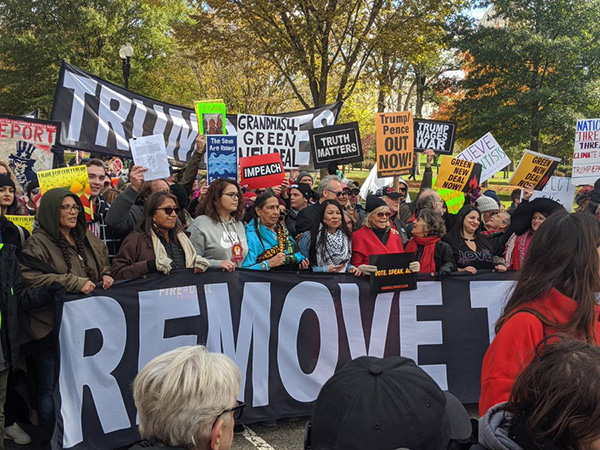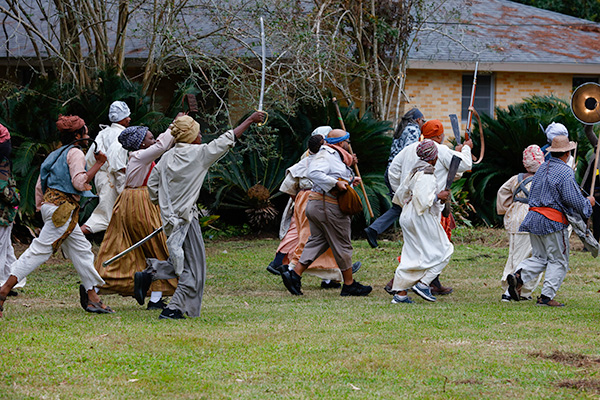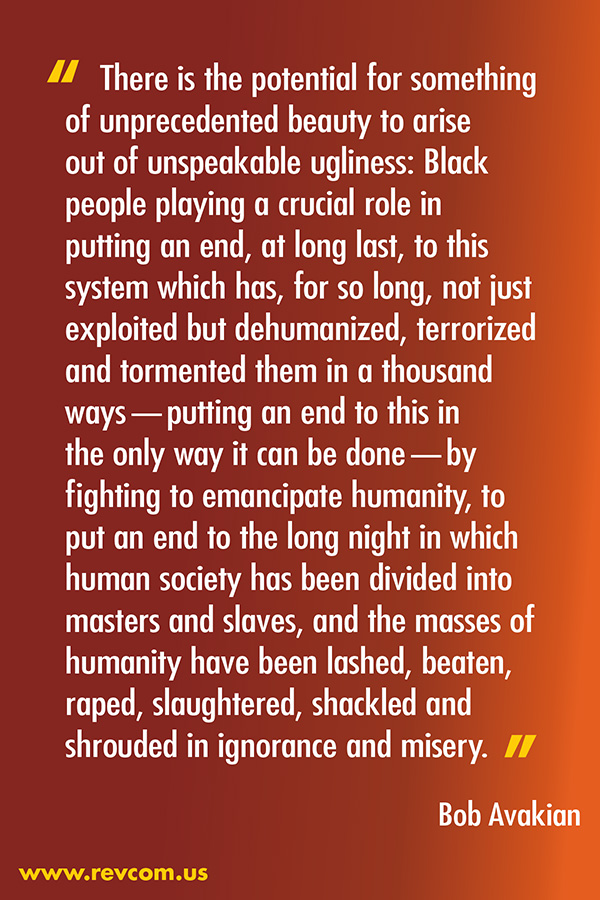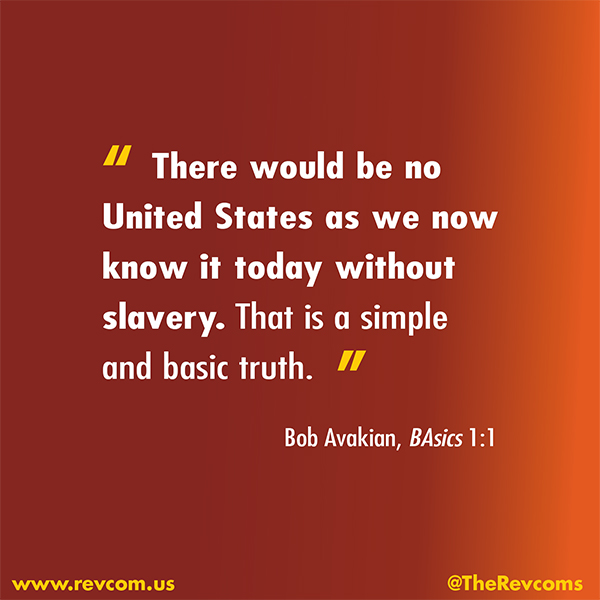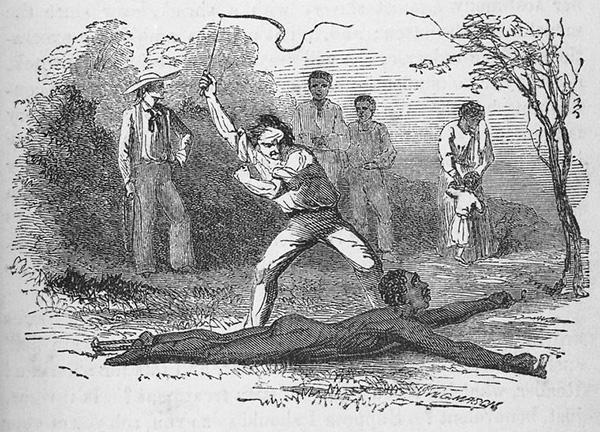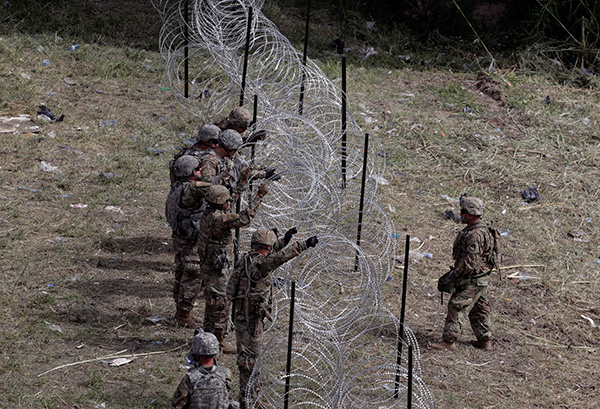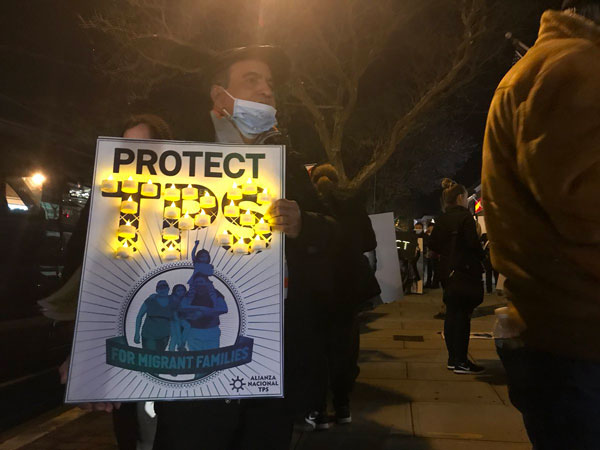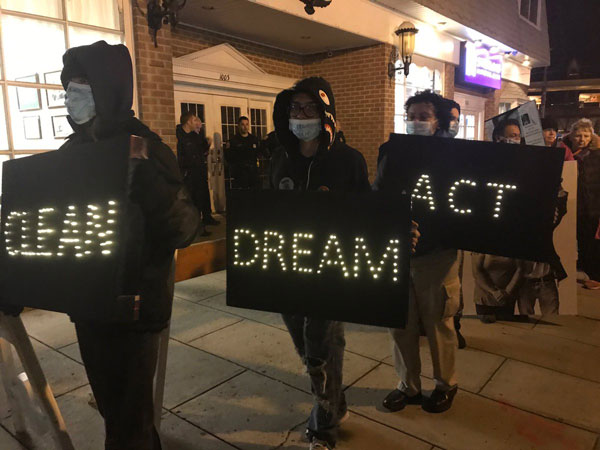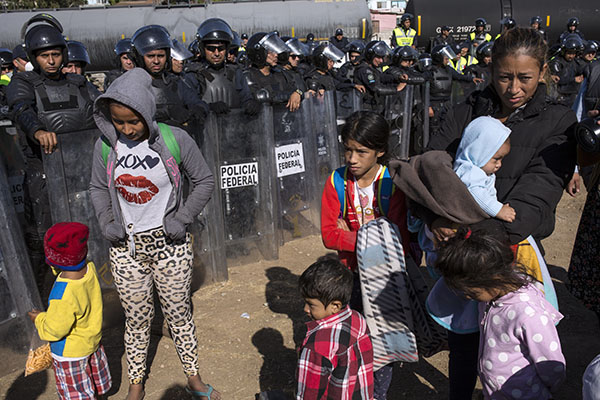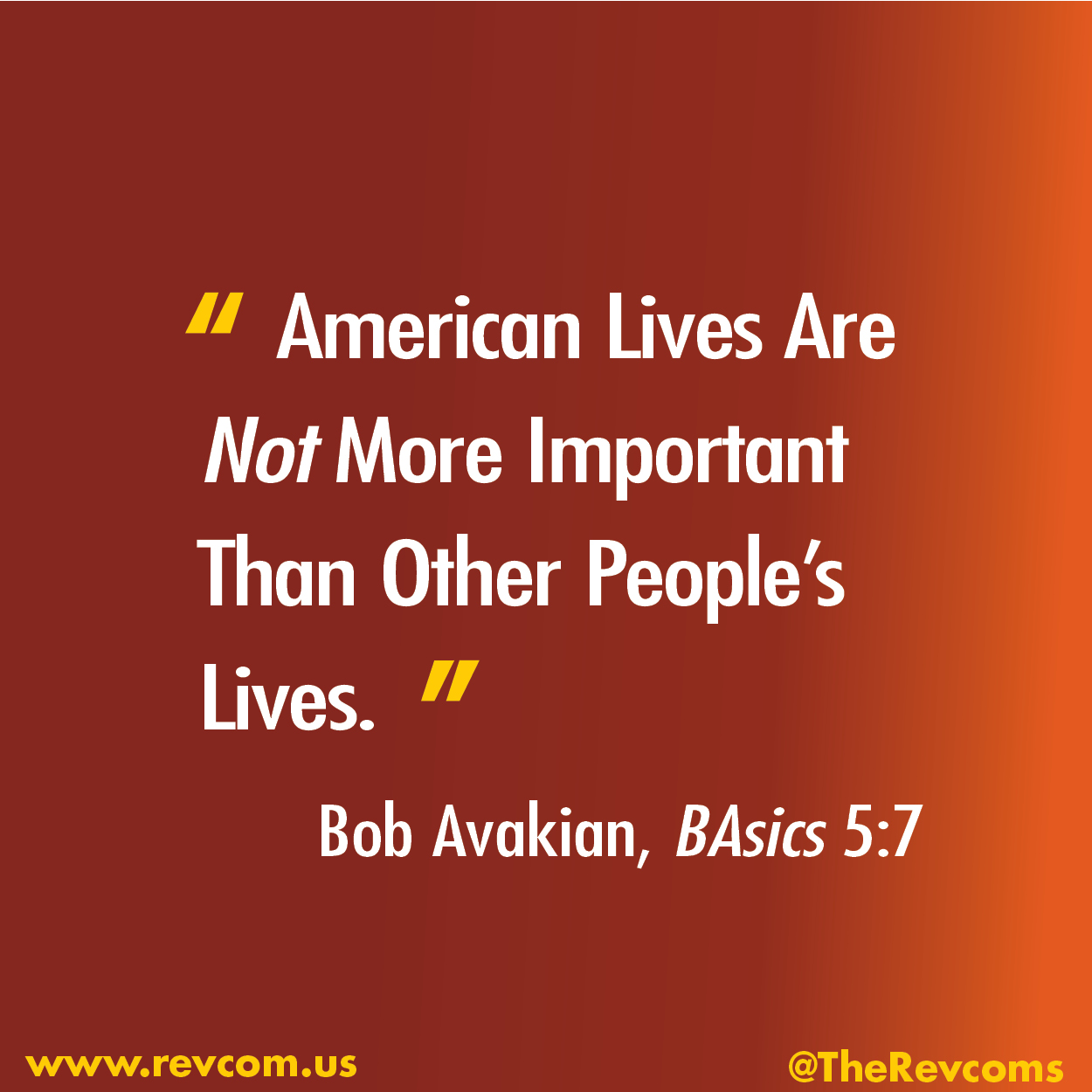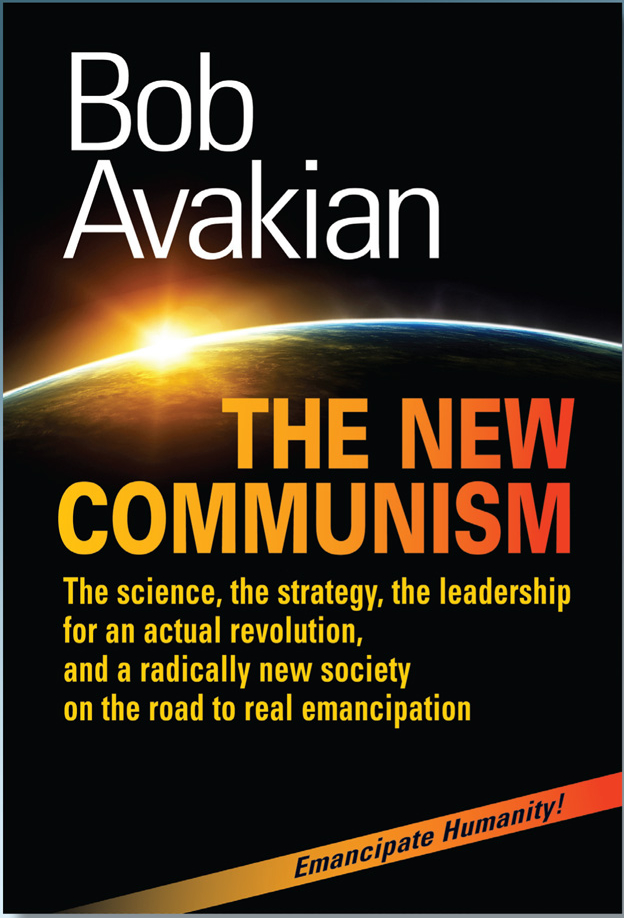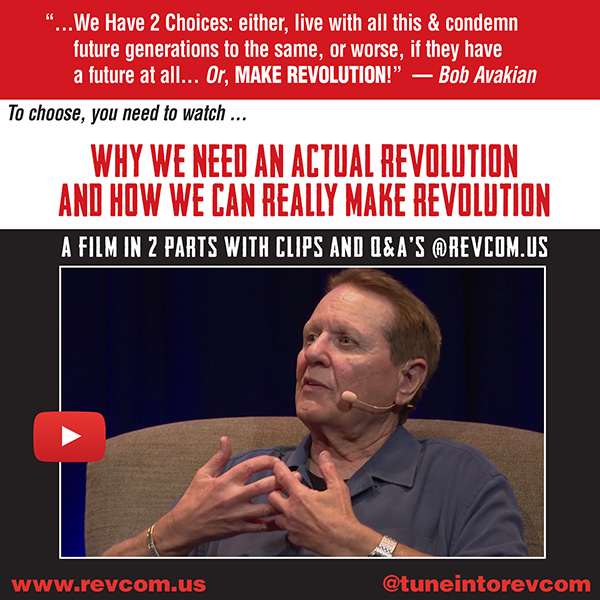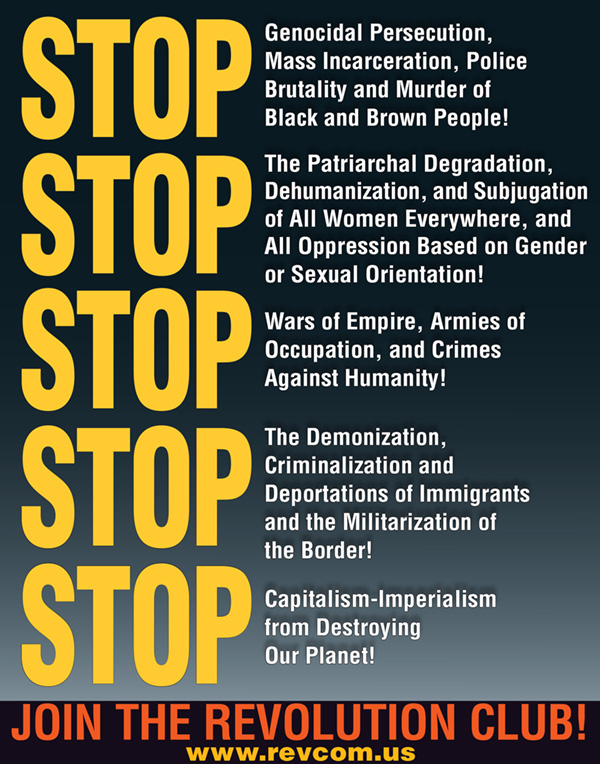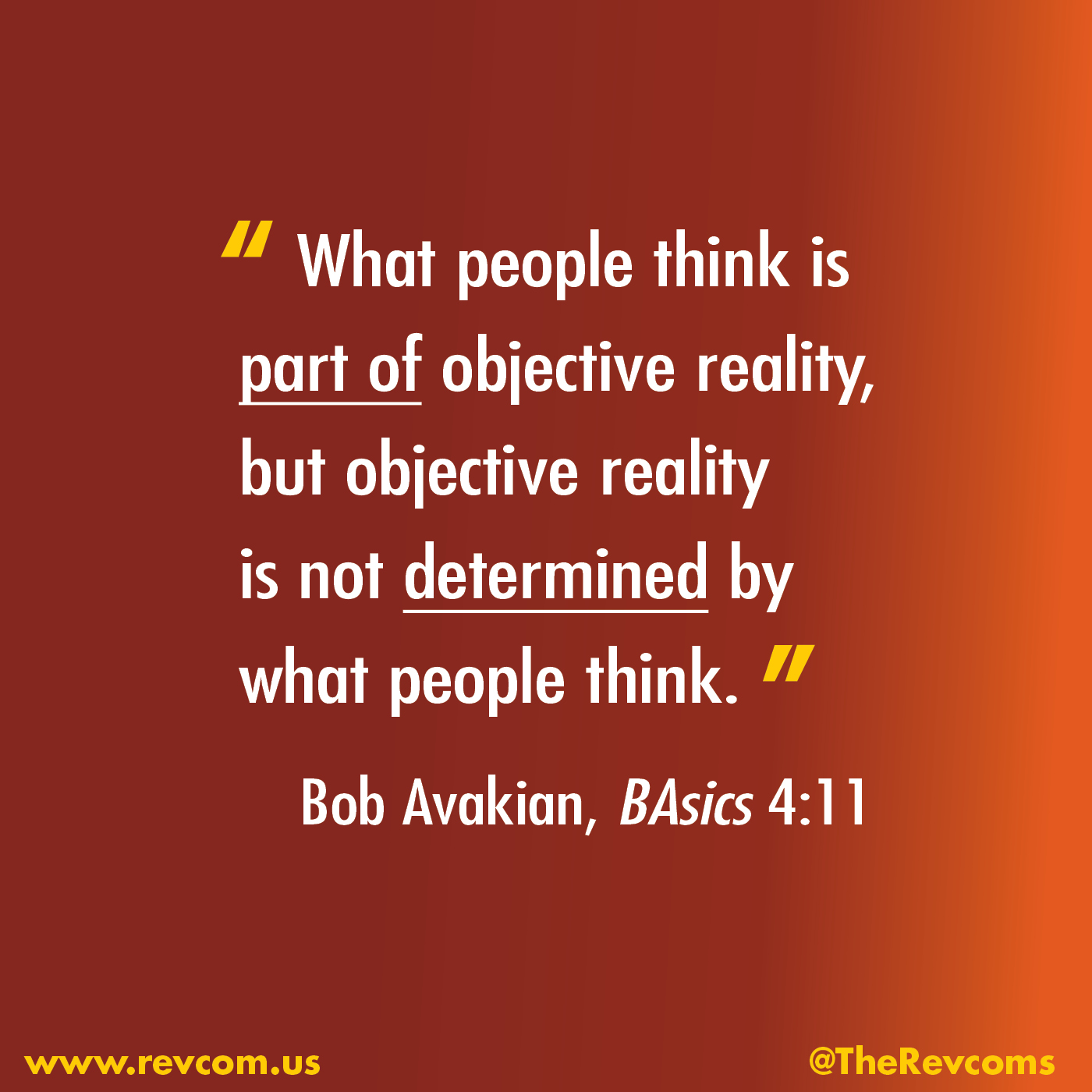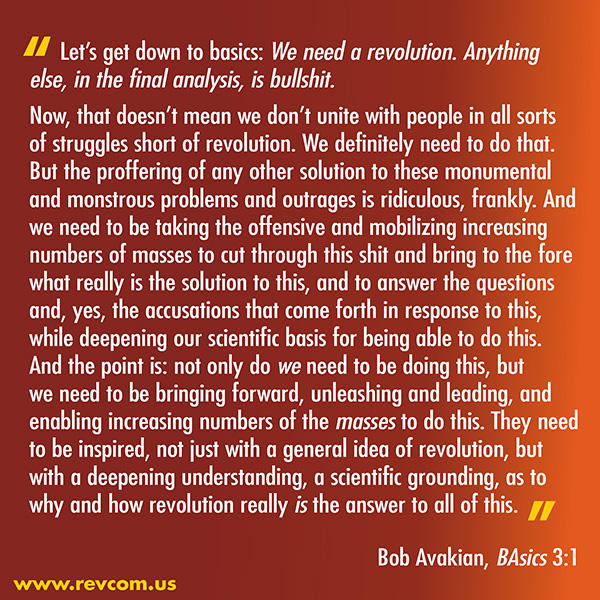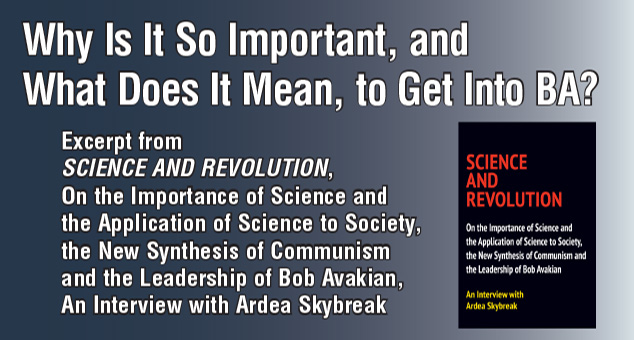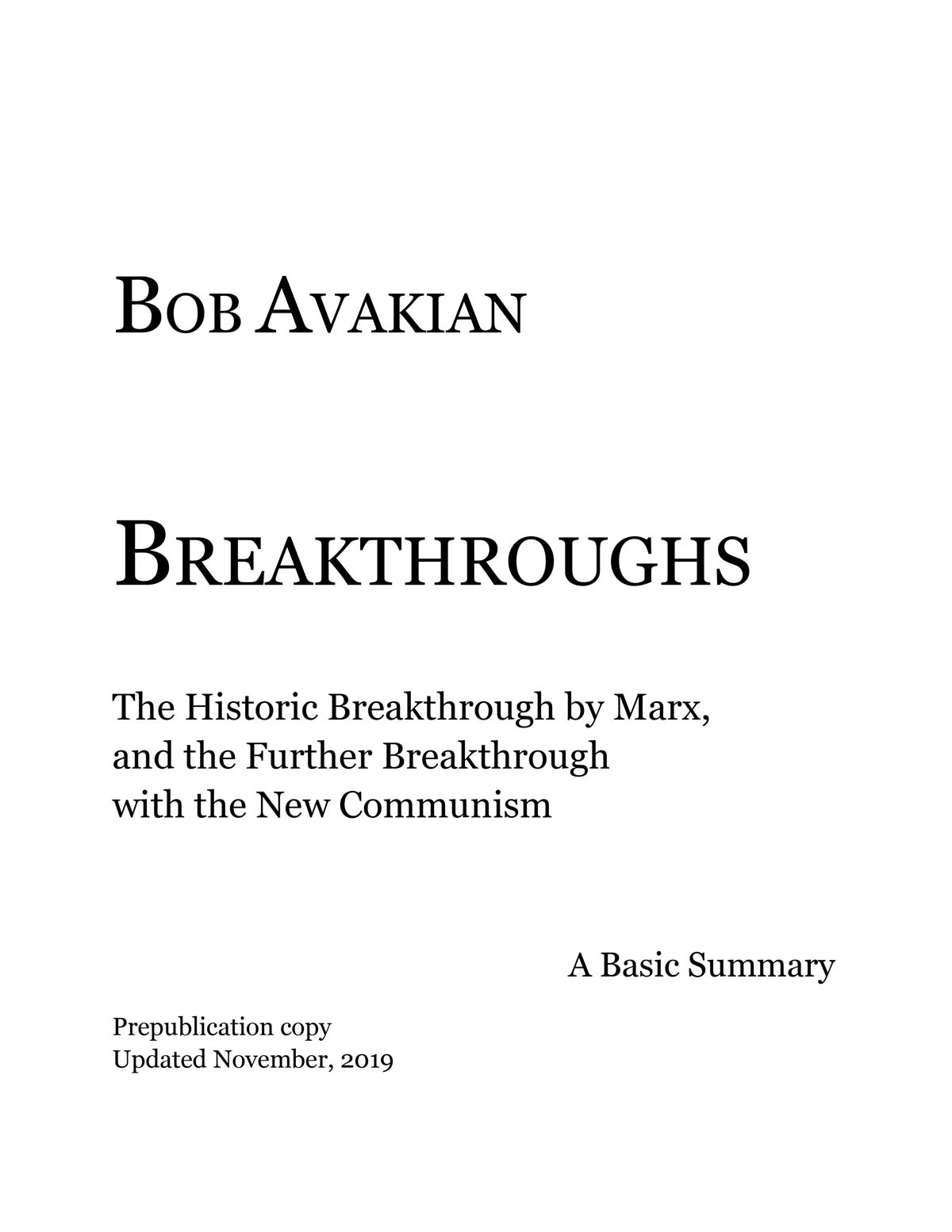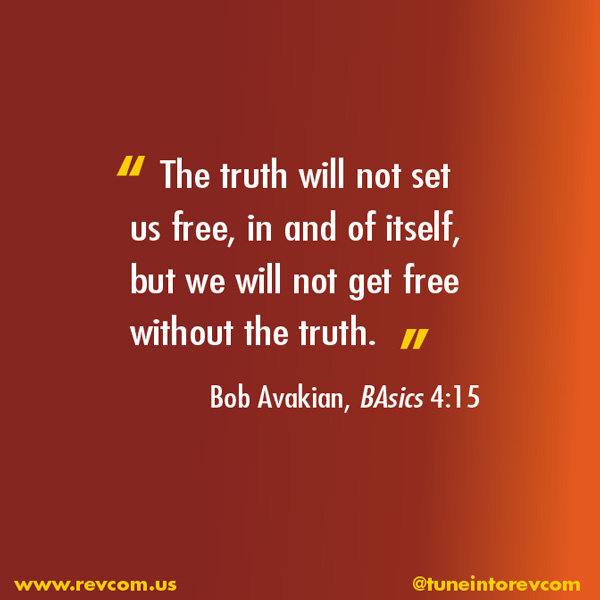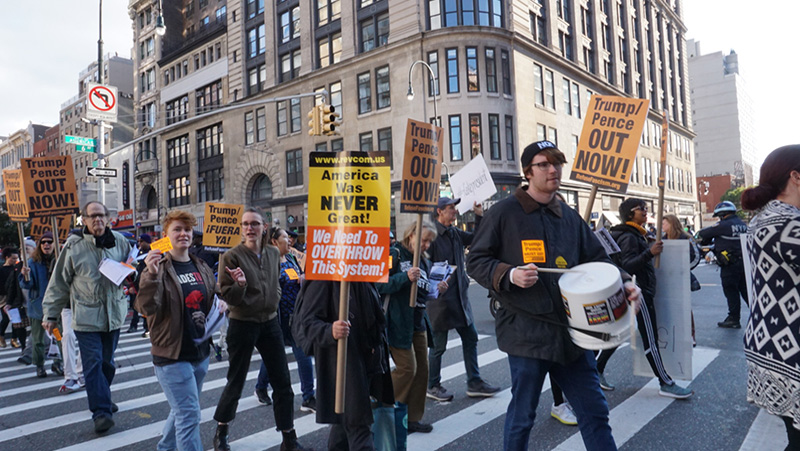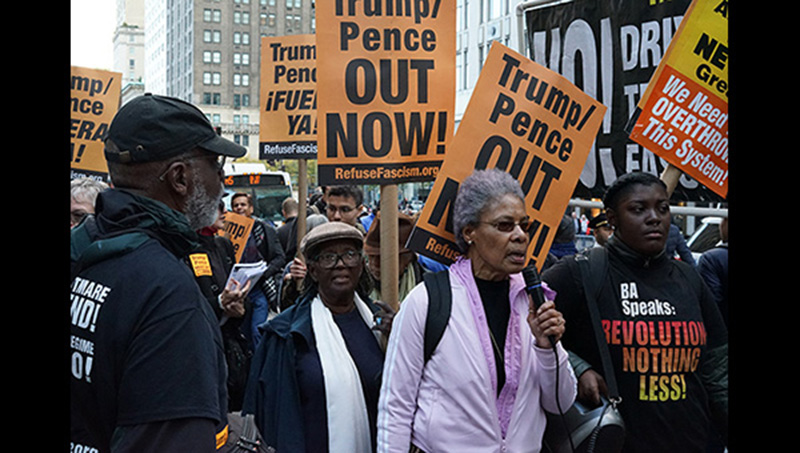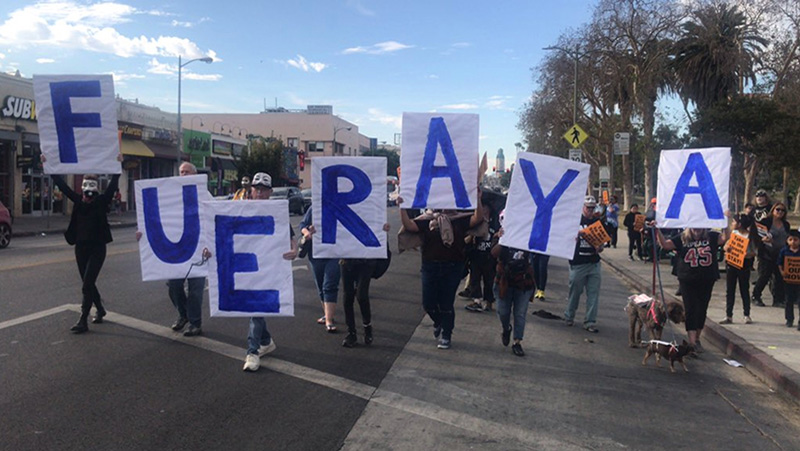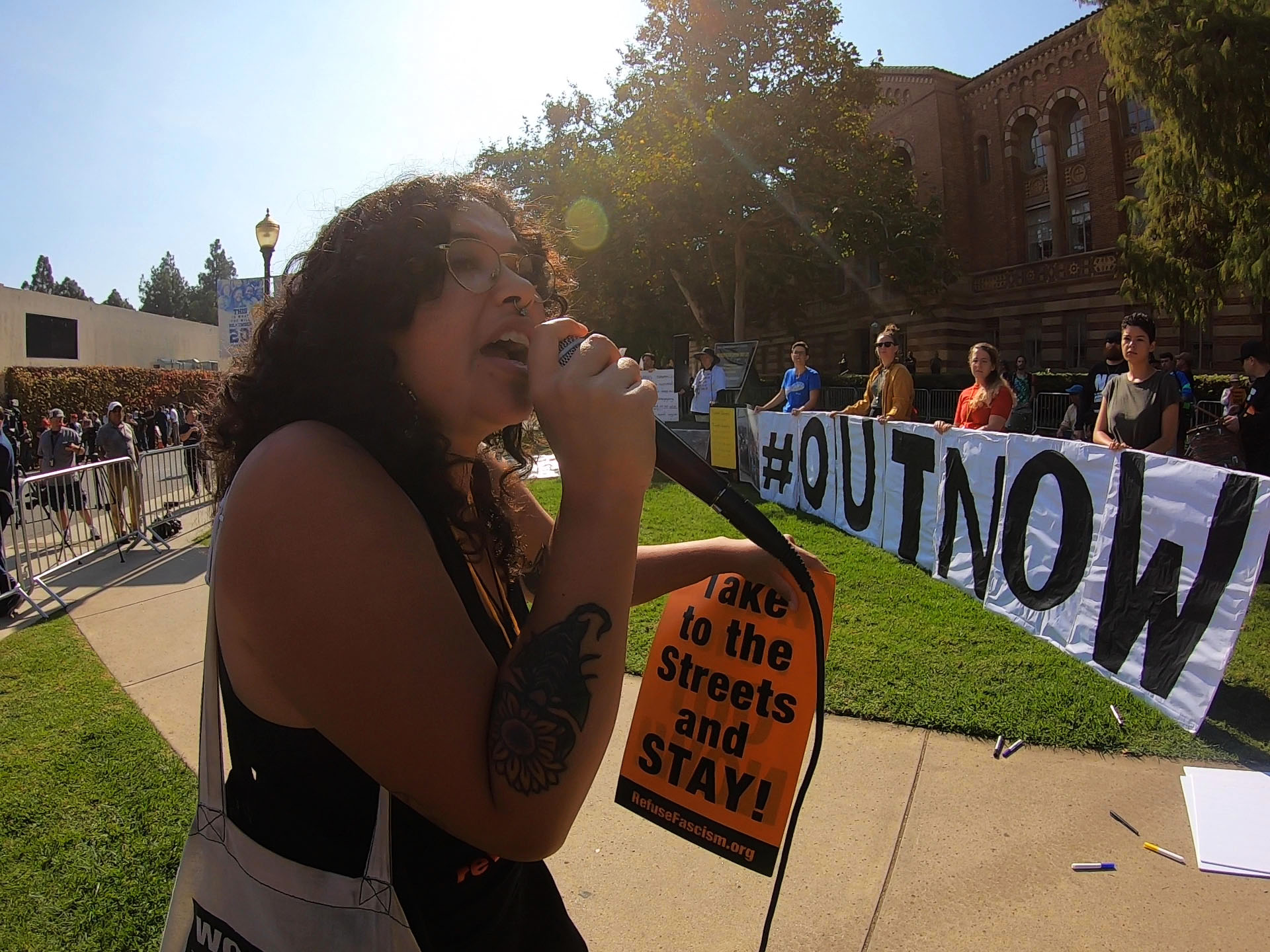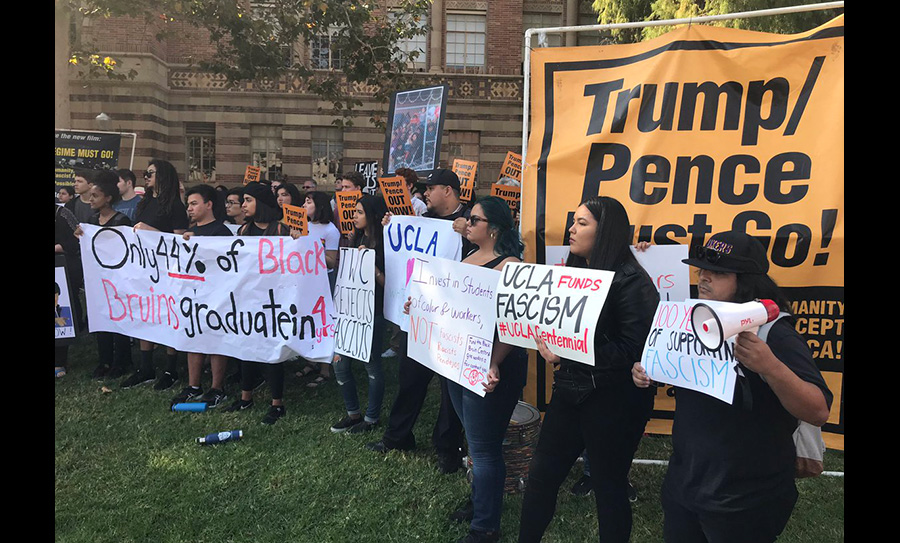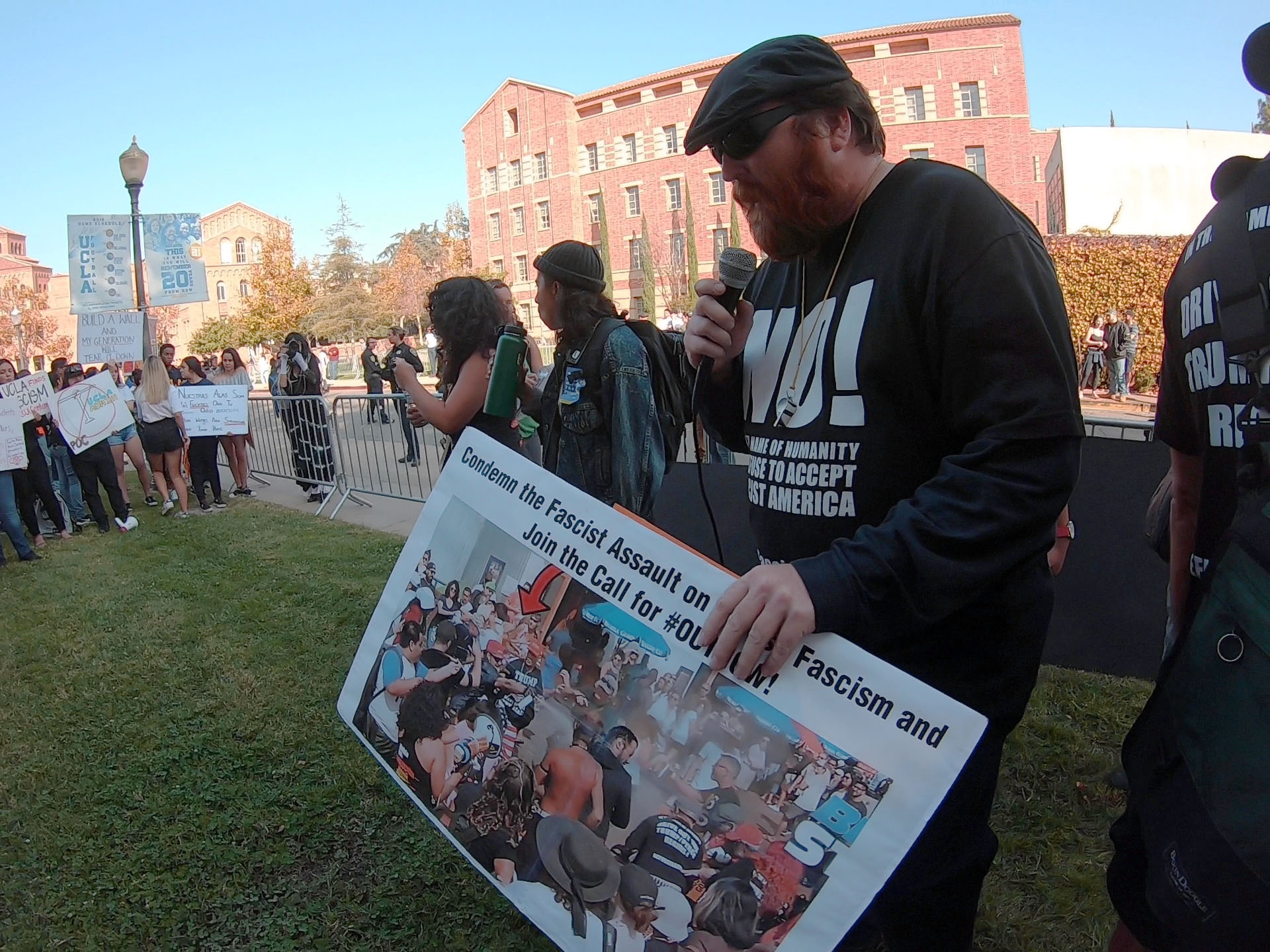Permalink: https://revcom.us/avakian/hope-for-humanity-on-a-scientific-basis/index.html
Hope For Humanity
On A Scientific Basis
Breaking with Individualism,
Parasitism and American Chauvinism
Bob Avakian
Author of The New Communism
Prepublication copy
November 2019
Copyright © 2019 by Bob Avakian. All rights reserved.
This is an important new work by Bob Avakian, from which the excerpt "Individualism, BEB and the Illusion of 'Painless Progress,'" which has been posted on this site since the summer of 2019, has been drawn.
Hope For Humanity
On A Scientific Basis
Breaking with Individualism,
Parasitism and American Chauvinism
Bob Avakian
Author of The New Communism
This is an important new work by Bob Avakian, from which the excerpt "Individualism, BEB and the Illusion of 'Painless Progress,'" which has been posted on this site since the summer of this year, has been drawn.
| revcom.us
CONTENTS
No Hope—vs. No Permanent Necessity
Virulent Individualism and Oblivious Individualism
Individualism, BEB and the Illusion of “Painless Progress”
Parasitism, American Chauvinism, and Individualism
Identity Politics and Individualism
Individualism and “Indifference”
Differing Views on the Meaning of Life, and Death: What Is Worth Living and Dying For?
Breaking Free of Parasitic Individualism
Lack of real hope for a better life in this world is a heavy chain weighing down, suffocating and deeply scarring the masses of humanity, including the youth who are concentrated in the ghettos and barrios of this country as well as its overflowing torture chamber prisons. And the extreme individualism promoted throughout this society, the obsessive focus on “the self,” has reinforced the heavy lid on the sights of people, obscuring their ability to recognize the possibility of a radically different and better world, beyond the narrow and confining limits of this system, with all its very real horrors. These are the major questions I am going to be speaking to here.
No Hope—vs. No Permanent Necessity
First, it’s important to speak to the contrast between today and the 1960s period in this country and in the world overall. At that time, back in the 1960s, masses of people all over the world, including in this country, were filled with hope and determination about the prospect of bringing into being a radically different and better world. Throughout the Third World, there were liberation struggles aimed at throwing off the yoke of colonial oppression that had been imposed on them for decades, generations and even centuries. And in the imperialist countries themselves—including, in particular, the U.S.—the generation that came of age in the 1960s had both the understanding of the need and a real belief in the possibility of bringing a radically different and better world into being, and was not interested in hearing all the arguments about why things had to be the way they are.
This was true among the educated youth, many of whom were among the first in their families to go to college, when things were being opened up by the ruling class because of its needs internationally, punctuated for example by the whole Sputnik episode when the Soviet Union sent a satellite into orbit and, all of a sudden, the U.S. was confronted with the so-called “space race” as part of the overall contention with the Soviet Union, which was itself at that point firmly on the road to restoring capitalism and striving to become a major world imperialist power but was, as such, posing a real challenge to the domination in the world by U.S. imperialism. So there were millions of new educated white youth who in turn were inspired by educated youth who had come from among the basic masses, in particular Black people, and had come to the fore of the civil rights struggle in the 1950s, particularly the late 1950s, and who, in the mid to late 1960s, became much more radicalized and went from civil rights to Black Liberation with a definite revolutionary orientation and impulse, however broadly defined and however differently understood among different people.
And this spread among the basic masses of people, the bitterly oppressed people in this country—Black people, but also Chicanos and others within the confines of the U.S. who’d been long oppressed—so that you had among these basic poor and oppressed people, as well as millions among the middle class educated youth, a desire for a radically different and better world, and a genuinely and strongly held revolutionary sentiment that this whole world needed to be turned upside down, and “We’re not gonna listen to anybody telling us about how ‘this is the best of all possible worlds,’ and we’re not gonna listen to the hypocrisy of the people who have presided over all these horrors all this time.” That was exemplified by the slogan, especially among the educated youth, “Don’t trust anybody over 30,” which, while a little mechanical, nevertheless had a real point: We don’t want to listen to these tired-out old “leaders.”
I remember myself, when I was about 20 (and now I have to look back and think about this as someone who’s gone on for decades after that!—but back when I was 20), I remember going with my father to Washington, D.C. and we went to the House of Representatives. And, at one point, we got into an elevator and all these decrepit old men got in the elevator who were congressmen, and I thought, “My god, these are the people running the country? This can’t stand! This is not what we need!” And this was a sentiment broadly shared in that period. (Of course, Jerry Rubin, one of the leaders of the youth movement of that time, once he became 31, adjusted the slogan to say “Don’t trust anybody over 35.” Nonetheless, whether 30 or 35, this was a real sentiment.)
Also, I have to say I was shocked when I went into the House of Representatives, because from the civics textbooks and how you’re brought up, I had this image of this very somber chamber, the “hallowed halls” of the House of Representatives. Well, I went in there and I was just amazed by what I saw. Here was some guy giving a speech. There were probably only a dozen people in the House of Representatives at the time, most of whom were doing things like eating and spitting on the floor, and so on. And then all of a sudden a bell rang and everybody came running in and put their hand up for a vote and then went back out again. This was not exactly the august chambers of the great democratic system that you’re taught in civics classes to believe is what’s happening.
So this was a sentiment that wasn’t simply a matter of age. It was more like: These people cannot be allowed to run the world and ruin the world in the way they are. This sentiment was held by millions and millions of poor and oppressed people, but also broadly among the middle class youth. And, as I pointed out in Why We Need An Actual Revolution And How We Can Really Make Revolution,1 by the end of the 1960s this had spread broadly and deeply throughout society, even into the armed forces of the very system, the capitalist-imperialist system, in this country itself. I remember, for example, that there was a poll taken by the military which, among other things, asked the question: whom did the soldiers, rank-and-file soldiers, of the U.S. army look to for political leadership—and, particularly among the Black soldiers, the president of the United States was way down on the list. The plurality, the highest “vote-getter,” if you will, was Eldridge Cleaver, a leader of the Black Panther Party. So when you have things like this, you have a real problem for the system. Even with Eldridge’s weaknesses and limitations, which were very real, this reflected something very, very positive.
As one manifestation of all this, among Black people—who we’re always told are just sort of inherently religious—there was a massive turning away from religion, especially among the youth. Why? Because people were filled with hope, they didn’t believe that there was no hope for a better world. They were full of hope for a better world right in this world. And so, among Black people, there was, on the part of the youth in particular, a major turning away from religion and from all the old conventions that went along with religion that were conservatizing influences holding down the people. Remember, there was Malcolm X, who would give speeches where (even though he was still religious, had taken up Islam) he said to people, “I don’t care” (I’m paraphrasing, but this is the essence of what he said) “I don’t care if you’re a Methodist or a Baptist or AME, or whatever you are, when you come out here into the world you need to leave that religion in the closet, because for all the good it’s done you, you need to put it aside.” Even though Malcolm X was still religious, he wasn’t saying, “Don’t be a Christian, be a Muslim”—he was saying, “We don’t need that stuff out here in the public sphere.” And he also said to the older generations: “These youth today, they don’t wanna hear anything about the odds, they don’t wanna hear you old Uncle Toms telling them about how the odds are against them.” This was a sentiment broadly taken up particularly by the youth, but also some older people. And this was not only among Black people. Malcolm X was a great inspiration and radicalizing influence, a very positive radicalizing influence and inspiration among educated youth, including many in the white middle class.
So this question of religion was manifested very differently. People were turning away from it. If you remember the movie Panther (not the recent movie Black Panther, but the older movie Panther, about the Black Panther Party), there is this scene where one of the youth is talking to his mother, sort of on the periphery of a Black Panther Party rally. The mother says something about religion, and the youth responds along these lines: “Well, the Black Panther Party says we just need to leave that religion alone, it’s not doing us any good, that’s not what we need.” (I’m paraphrasing again, but that’s the essence of it.) And the mother replies: “You believe that?” Well, a lot of Black youth at that time very much believed it.
Religion is always presented as a source of “hope” or of consolation. But is it really a source of hope—or is it, in essence and in its defining aspect, a paralyzing illusion? Religion holds out the concept of consolation for suffering, and looking to another world and other-worldly forces to get some sort of consolation for all the suffering that people are subjected to, and in order to make it through the day. But the question is: Is what people need consolation for the suffering that they’re put through under this system, or do they need to rise up and abolish the system which embodies and enforces this suffering, and in so doing eliminate the need for consolation for suffering that they’re no longer being put through, the unnecessary suffering they’re being put through? It was pointed out by Ardea Skybreak in the interview Science and Revolution,2 that it’s unrealistic to think that you could ever completely do away with human suffering, but there’s a tremendous amount of unnecessary suffering that people are subjected to in the world today because of the dynamics and the basic relations of this system that dominates the world, the system of capitalist imperialism. And it is definitely possible, and urgently necessary, to put an end to that suffering.
Now, to present a fully accurate, all-sided picture of this, we know that there are many religious people whose religious views and sentiments do inspire and drive them to take stands against and to even sacrifice in the struggle against oppression. And this, of course, should be respected and united with. But, at the same time, that does not eliminate the need for sharp struggle in the ideological realm against the outlook that religion purveys and the role that religion plays as a mental shackle on masses of people, in fact working against their acquiring and systematically and consistently applying a scientific approach to understanding reality, and in particular what it is that’s causing the suffering that the masses of humanity are being subjected to and what is the solution to that. So there’s a need for continuing exposure and struggle around the role of religion ideologically, its role in terms of being a mental shackle on people, even while it’s also necessary to unite with and, yes, respect people who out of religious sentiment or viewpoints take a positive stand and often sacrifice in the struggle against various forms of oppression.
Things are very different, however, with regard to religious fundamentalism—and in particular in this country Christian fundamentalism. The Christian fundamentalists (including the current vice president Mike Pence and others in powerful positions in government, the media, and other major institutions) are a driving force for theocratic fascism (tyrannical rule by Dark Ages religious authority). They adhere to and aggressively propagate unthinking allegiance to and application of religious dogma which, when taken literally (as these Christian fascists insist upon), promotes and will lead to all kinds of atrocities and horrors (as can be seen in both the Old and the New Testaments of the Bible—something I analyzed in Away With All Gods!).3
In the opening section of the book The New Communism (“Introduction and Orientation”) I spoke to the bitter reality that the masses of oppressed people are afraid to hope:
Afraid to hope that maybe the world doesn’t have to be this way, that maybe there is a way out of this. Afraid to hope, because their hopes have been dashed so many times.4
This is a significant factor in why so many turn to religion—because there does not seem to be any hope for an end, in this world, to the terrible suffering and degradation to which they are continually subjected, which is imposed on them by the functioning of this system but which is also obscured and covered over by the very way this system operates and the role of its institutions, functionaries and enforcers, which systematically act to mislead people as to why the world is the way it is and whether and how it could really be changed, whether and in what way it is possible to put an end to all this unnecessary suffering.
Here stands out again the great importance of the scientific method and approach of communism, as this has been further developed through the new communism, and the reality and possibility of radical, emancipating change, in this world. In relation to all this, and in particular the question of hope, there is great importance to the following statement by Marx which is cited in Part I of the RCP Manifesto, Communism: The Beginning of a New Stage:
Once the inner connection is grasped, all theoretical belief in the permanent necessity of existing conditions breaks down before their collapse in practice.5
This is extremely important because it gives emphasis to the importance of theory and of science—theory that’s grounded in and is an application of a consistently scientific method and approach—to reveal what are the actual relations and dynamics, what are the inner connections and “inner workings,” of the system that people are subjected to. First of all to reveal that there is a system that they are subjected to, and what are the inner workings and dynamics of that system and how it fits into the whole historical development of human society. (Or, in basic terms, that people are living within the confines of a system; that this system is not just something imposed by some powerful people, but is the result of certain historical development; that this system operates, and must operate, according to certain “rules” that flow from its basic relations, and that this embodies and gives rise to contradictions that cause all kinds of suffering for the masses of humanity, contradictions that are fundamental and essential to this system and cannot be eliminated without eliminating this system itself). And this scientific theory reveals that there is a way out of all this—and what that way out is.
Yes, ultimately the struggle has to be carried out in the realm of practice; it has to be carried out in the actual struggle to go up against and ultimately overthrow the system which embodies and enforces all this horrific oppression. But there’s a tremendous importance to people, even before they become highly developed theoretically, to get a basic understanding that there is no necessity, there is no permanent necessity, to the existing conditions, and why that is so. This is the source of hope, not on the basis of illusions such as those propagated and perpetuated by religion, but on a scientific basis.
The following (the conclusion of the article “‘A Leap of Faith’ and a Leap to Rational Knowledge: Two Very Different Kinds of Leaps, Two Radically Different Worldviews and Methods”) emphasizes these extremely important points of orientation:
Knowing about actual reality—and continually learning more about it—is vitally important for humanity and its future; it is vitally important not only for people in the sciences and the academic world but for the brutally oppressed and exploited people of the earth, who must and can be the backbone and driving force of a revolution to throw off and put an end to all forms of exploitation and oppression, throughout the globe—to be the emancipators not only of themselves but ultimately of all humanity. Confronting reality as it actually is—and as it is changing and developing—and understanding the underlying and driving forces in this, is crucial in order to play a decisive and leading role in bringing about this revolution and ushering in a whole new era in human history, which will shatter and remove forever not only the material chains—the economic, social and political shackles of exploitation and oppression—that enslave people in today’s world but also the mental chains, the ways of thinking and the culture, that correspond to and reinforce those material chains. In the Communist Manifesto, Karl Marx and Frederick Engels, who founded the communist movement over 150 years ago, declared that the communist revolution, and its emancipating principles, methods, and aims, involves a “radical rupture” not only with the traditional property relations that enslave people, in one form or another, but also a radical rupture with all traditional ideas that reflect and reinforce those traditional property relations.
The struggle in the realm of epistemology—the theory of knowledge and how it is acquired by people, the theory of what is true and how people come to know the truth—is a crucial arena in the overall battle for the emancipation of the oppressed and exploited majority of humanity, and ultimately of humanity as a whole. Grasping the defining characteristics and the importance of the scientific method—and, most of all, the most consistent, systematic and comprehensive scientific approach to reality, the communist world outlook and method, which can embrace without replacing or suffocating the many fields of human knowledge and endeavor and can give expression to the richest process of learning about reality and transforming it in the interests of humanity—is of vital importance for this emancipatory struggle. Understanding the profound difference between the attempt to impose “faith-based” notions on reality and, in opposition to that, pursuing a scientific understanding of reality, including of religion and its origins and effects—understanding the radical difference between “leaps of faith” and the ongoing acquisition of knowledge through continual leaps from perceptual knowledge to rational knowledge—this is a crucial part of carrying forward the struggle to achieve the two radical ruptures that mark the communist revolution as the leap to a whole new, liberating era in human history.6
This question, of seeing the possibility for revolution and a radically different and better world, on a scientific basis, is obviously extremely important, and is something to which I will return later.
The Problem of Individualism
As I have pointed out, in Ruminations and Wranglings7 (and in other works), the contradiction that people exist as individuals, but they also exist in a larger social context and are largely shaped by that social context, is a complicated contradiction that is important to handle correctly. And this contradiction is acutely expressed today in the fact that while people do exist as individuals, the terrible suffering of the masses of humanity and the urgent challenges facing humanity as a whole as a result of the escalating destruction of the environment by this system of capitalism-imperialism as well as the possibility of nuclear conflagration that continues to loom as an existential threat over humanity—all this cannot be seriously addressed, let alone actually solved, by each person pursuing their particular individual interests, and in fact people acting in this way constitutes a major obstacle to bringing about the necessary solution. Individualism is a significant factor and “unifying element” in much of the negative trends that play a major role in keeping people from recognizing the reality and depth of the horrors continually brought about by this system—and recognizing the urgent need to act, together with others, to abolish and uproot all this, at its very source. This highlights and heightens the fact that individualism, which is encouraged and expressed in extreme forms in this particular society at this time, is a profound problem that must be confronted and transformed.
Virulent Individualism and Oblivious Individualism
These are two broad categories of individualism, which have some different particular characteristics but also have in common the basic focus on and preoccupation with the self. Virulent individualism is an extremely poisonous variation of this. It’s basically the view that “I’m out to get everything I can for myself and fuck everybody else. And if I have to trample on everybody else to get what I want, that’s just the way it is and I’m gonna do it the best I can, so I can get everything I want—I want it all and I want it now.”
Oblivious individualism is individualism that may not have those particular aggressive characteristics and may not even have a consciously hostile attitude toward other people in general, but involves going along pursuing one’s particular interests, aspirations, or “dreams,” without paying attention to the larger things that are going on in the world and the effect of this on masses of people throughout the world and indeed on the future of humanity.
So there are these different kinds, or two broad types, of individualism (with many gradations, obviously). But what is the unifying element in them? Self. The self. As I pointed out in the Dialogue with Cornel West8 in 2014, the “selfie” is a perfect iconic representation of this whole outlook and this whole culture. It’s not that every “selfie” is in and of itself bad, of course. But there is a whole culture around it, even to the point where people go to a beautiful place in nature and what are they preoccupied with? Taking a “selfie” of themself instead of taking in (and yes, taking photographs of) the vast beauty that’s stretched out before them. The important thing, with this outlook, is: “Here I am, look at me.” It’s the “look at me, look at me, look at me” ethos that is so predominant in both these forms of individualism, even in the one that’s not consciously virulent but is nevertheless strikingly oblivious.
Oblivious individualism may seem more benign (or, in simple terms, less “nasty”) but it is nonetheless marked by being inexcusably ignorant of, or consciously choosing to ignore, what is happening in the larger world, beyond the self (and the narrow circle around oneself), and the consequences of this for the masses of people in the world, and ultimately for all of humanity—or paying attention to this only as it affects oneself in immediate and narrow terms.
Now here let me be very clear: There are people in the world, masses of people in the world, whose lives are so chaotic and whose suffering is so terrible that it’s very difficult for them even to engage, let alone learn about, much of what’s going on in the world. I’m not talking about those people whom the operation of this system grinds down and subjects to so much horror that, on their own, they are really deprived of even the opportunity to learn about and to engage the larger world. I’m talking about people who have every opportunity to do so but, either with a malignant (or virulent) mentality, or in a more “benign” but nevertheless oblivious way, choose not to pay attention to these things. I’m not necessarily opposed to people watching some videos or YouTubes of cats playing the violin (and similar things on the internet), but if that kind of thing is your preoccupation—let alone if snark and tearing down other people on the internet is your preoccupation—then, obviously, this is something any decent person should be very concerned about and strongly oppose and struggle sharply against.
[Note added by the Author, Fall 2019:]
This work is the edited text of a talk given in the spring of 2019, and the following section (“Individualism, BEB and the Illusion of ‘Painless Progress’”) has been published (posted at revcom.us) beginning in the summer of this year. In late September 2019, Nancy Pelosi (and the Democratic Party leadership of which she is a prominent representative), after a prolonged stubborn insistence on refusing to impeach Donald Trump, reversed course and announced that an “impeachment inquiry” of Trump would be undertaken. This reversal was hinged upon—and Pelosi and Company have made an attempt to focus this “impeachment inquiry” overwhelmingly, if not solely, on—the revelation (stemming from a report by a government “whistleblower”) that Trump has been involved in an effort to pressure the government of Ukraine to do Trump the “favor” of digging up (or “cooking up”) dirt on Joe Biden, former vice president (under Obama) and a leading contender for the Democratic Party nomination for the presidential election in 2020. Pelosi and the Democrats have identified this as an abuse of presidential power, in pursuit of Trump’s personal interests (particularly looking ahead to the 2020 election) and have given emphasis to their insistence that, in making this “favor” the basis (and the price) for the continuation of the U.S. military aid to Ukraine, in its confrontation with pro-Russian forces, Trump “undermined U.S. national security,” particularly in relation to its major adversary Russia. In other words, while, from their bourgeois perspective, their concern is very real in regard to the imperialist “national interests” of the U.S., the “norms” of how this system’s rule has been imposed and maintained, the importance to them of a “peaceful transition” from one administration to another through elections—and the danger posed to this by Trump’s trampling on these “norms”—Pelosi and Company, in focusing this “impeachment inquiry” on this narrow basis, have underlined the fact that they are acting in accordance with their sense of the interests of U.S. capitalist imperialism and its drive to remain the dominant imperialist power in the world, and that they continue to refuse to demand Trump’s ouster on the basis of his many outrageous statements and acts directed against masses of people, not only in the U.S. but internationally: his overt racism and promotion of white supremacy and white supremacist violence; his gross misogyny and attacks on the rights of women, including very prominently the right to abortion, and on LGBT rights; his repeated calls for and backing of intensified brutal repression and suppression of dissent; his discrimination against Muslims and his cruel targeting of immigrants, involving confinement in concentration camp-like conditions, including for those fleeing from persecution and the very real threat of death in their “home countries” and seeking asylum on that basis, and the separation of even very young children from their parents; his assault on science and the scientific pursuit of the truth, including denial of the science of climate change and continuing moves to undermine and reverse even minor and completely ineffective protections of the environment; his threats to destroy countries, including through the use of nuclear weapons—in short, his all-around drive to fully consolidate fascist rule and implement a horrific, fascist agenda, with terrible consequences for the masses of humanity.
While, as of this writing, it is not clear what this “impeachment inquiry” will lead to—whether Trump will actually be impeached in the House of Representatives, and what will happen then in the Senate to determine whether he should be convicted and removed from office—it is already clear that the way in which the Democrats are seeking to narrowly focus the move to oust Trump emphasizes yet again the importance of these basic points of orientation:
The Democrats, along with the New York Times and the Washington Post, etc., are seeking to resolve the crisis with the Trump presidency on the terms of this system, and in the interests of the ruling class of this system, which they represent. We, the masses of people, must go all out, and mobilize ourselves in the millions, to resolve this in our interests, in the interests of humanity, which are fundamentally different from and opposed to those of the ruling class.
This, of course, does not mean that the struggle among the powers that be is irrelevant or unimportant; rather, the way to understand and approach this (and this is a point that must also be repeatedly driven home to people, including through necessary struggle, waged well) is in terms of how it relates to, and what openings it can provide for, “the struggle from below”—for the mobilization of masses of people around the demand that the whole regime must go, because of its fascist nature and actions and what the stakes are for humanity.
Clearly, the removal of not just Trump, but also the Christian fascist vice president Mike Pence, and indeed this whole fascist regime, is of urgent importance. But this will only serve the fundamental interests of the masses of people—not just in this country but in the world as a whole—if this is achieved, not on the basis of confining things within the terms of and through the furthering of the “national interests” of the monstrously oppressive U.S. empire, but on the basis of the mobilization of mass opposition to the fascism of this Trump/Pence regime, which has been produced by and risen to power through the “normal functioning” of this system, of which it is an extreme but not somehow an “alien” expression.
[End of Note added by Author, Fall 2019]
Individualism, BEB and the Illusion of “Painless Progress”
All this—even the seemingly more “benign,” or oblivious, individualism—links up with the repeated and stubborn insistence on chasing after the illusion of painless progress. If something makes people uncomfortable—and still more, if it holds out the prospect of sacrifice, necessary sacrifice, on their part—far too many people turn away from it. As I’ve pointed out before, there’s this whole attitude of approaching reality as if it’s a “buffet,” or approaching it like a consumer: “Well, that makes me uncomfortable. I’ll just leave that to the side. I don’t want to look at that because that makes me uncomfortable.”
I am going to talk later about some of the more ridiculous and outrageous forms of this. But just to give a little preview, as I pointed out in The New Communism, some people went on one of the college campuses a couple of years ago with a poster of Stolen Lives, people who’d been killed by police (not all of them, by any means, but dozens), and someone came up and starting whining: “I don’t like that poster, it makes me feel unsafe.” As I commented at the time: Oh, boo-hoo! Let’s get out of this boo-hoo shit and start talking about and engaging seriously what’s happening to masses of people, one significant part of which is represented by what’s on that poster.
One of the most common and problematical forms of this repeated and stubborn insistence on chasing after the illusion of “painless progress,” particularly among people who consider themselves somewhat enlightened (or progressive, or “woke,” or however they want to put it), is what we very rightly term BEB—Bourgeois Electoral Bullshit—and the phenomenon that people continually confine themselves to the narrow limits of what is presented to them by one section of the ruling class, as embodied in the Democratic Party: “These are the limits of what I’ll consider in terms of possibly bringing about change”—because this is the well-worn rut of what is, at least up to this point, relatively safe in terms of political engagement. It may even become not-so-safe in the future, depending on how things go with these fascists who are working to consolidate their power right now through the ruling regime of Trump and Pence. But for now it seems relatively painless. It is also completely ineffectual and doesn’t bring about any kind of change that’s needed, but it’s a way to feel that you’re doing something while avoiding any sacrifice, and even any real discomfort.
One of the ways this gets expressed, along with the BEB, is people, in their masses, not confronting the reality of Trump/Pence fascism, and therefore not acting in a way commensurate with the danger and the potentially even greater horrors this represents.
Just to step back, and to speak to a very important element of this that I’ve touched on before, Trump’s election—through the electoral college, not the popular vote—is, in a real sense, an extension of slavery: the people who voted for Trump are the kind of people who would have been pro-slavery, had they been around at the time of slavery in the United States. And those who find it acceptable to have the overt white supremacist Trump in the White House are the kind of people who would have ignored or would have openly accepted and justified or rationalized slavery when it existed. And here I have to invoke what I thought was a very insightful comment by Ron Reagan (yes, Ronald Reagan’s maverick son, who is also, to his great credit, an unabashed atheist): Trump’s much-analyzed, over-analyzed, “base” will continue supporting him, no matter what he does, Ron Reagan has pointed out (and this is very insightful), because Trump hates all the same people they hate.
As opposed to all the obfuscation about the economic difficulties people are going through, blah, blah, blah, that is often used to rationalize why people voted for and continue to support Trump, what Ron Reagan has sharply pointed to is the essence of Trump’s “base.” And, by the way, notice how all the mainstream media, CNN and so on, continually use this term: Trump’s “base.” This is a neutral term, “base.” These are a bunch of fascists, okay? And by using these euphemisms, or these neutral terms, like “base,” you’re obscuring and keeping people from seeing what is actually represented by Trump and those who support him, and the depth of the real danger this poses. Ron Reagan’s comment is very much to the point. He went on to elaborate: They hate LGBT people, they hate women (independent women, and really all women), they hate Black people, they hate immigrants, they hate Muslims, and so on. And Trump hates all the same people they hate.
That is why they’ll never desert him, whatever he does. That is why he could very rightly make the comment: “I could shoot somebody on Fifth Avenue in New York City and these people wouldn’t turn against me.”
At the same time, it has to be bluntly said: For the millions, and tens of millions, who say they hate everything Trump stands for and what he is doing but who, after all this time, have still not taken to the streets in sustained mobilization demanding that the Trump/Pence regime must go, this makes them collaborators with this fascist regime and themselves guilty of the egregious crime of tolerating this regime when they still could have the possibility of achieving the demand that it must go, through such mass mobilization!
To paraphrase Paul Simon: They are squandering their resistance for a pocketful of mumbles—and worse—from the Democratic Party.
It is long past time—and there is still time, but not much time—for this to change, for masses of people to finally take to the streets, and stay in the streets, with the firm resolve that this fascist regime must go!
And here are some very relevant questions for the millions and tens of millions who hate everything Trump stands for but have failed or refused to mobilize, in their masses, in non-violent but sustained action around the demand that the Trump/Pence regime be removed from power, as has been called for by Refuse Fascism9: If you will not take to the streets now to demand that the Trump/Pence regime must go, what will you do if Trump is re-elected (perhaps through the electoral college, even if he again loses the popular vote)? And what will you do if Trump loses the election (even by the electoral college count) but then refuses to recognize the results and insists he is still President?!
At the same time, it is necessary to point to the very serious problems with the dangerous naiveté and “left” posturing of certain “progressive” intellectuals. For example, someone like Glenn Greenwald, who has done some good things in exposing the violations of people’s rights under this system—human rights, civil rights and civil liberties—but who, whenever anything’s brought out about the terrible crimes and horrors that are represented by the Trump/Pence regime, insists upon immediately saying things like, “Yes, but what about Hillary Clinton, and what about the Democrats, and the terrible things they have done?” All of which is true. As we have pointed out: The Democratic Party is a machine of massive war crimes and crimes against humanity. And this does need to be brought out. At the same time, it is necessary to recognize that the Republican Party is fascist, and if you don’t understand that this has real meaning and real importance—and every time someone speaks to the outrages and horrors perpetrated by these fascists, you insist on immediately raising, “Yes, but what about the Democrats?”—you’re leading people, or pointing people, away from an understanding of the real dynamics going on here and the real dangers.
And then there is Slavoj Žižek. As is very bluntly, and very accurately, put in the article by Raymond Lotta, “Slavoj Žižek Is a Puffed-Up Idiot Who Does Great Damage”:
Slavoj Žižek, an influential fool-of-a-philosopher who often poses as a “communist,” declared his support for Donald Trump on British TV. A victory for Trump, according to Žižek, will help the Republicans and Democrats “rethink themselves”—and could bring about “a kind of big awakening.” And speaking from his “what-me-worry” perch [Lotta goes on], Žižek pronounced that Trump “will not introduce fascism.”10
As Lotta then succinctly states: “This is wrong, this is poison.” And it is similar to the kind of wrong and dangerous thinking that people like Glenn Greenwald fall into and propagate. Similarly to Glenn Greenwald, it involves playing down the actual reality and danger of what’s represented by fascism, even as, once again, the Democratic Party is an instrument of bourgeois dictatorship, and a machine of massive war crimes and crimes against humanity.
This kind of wrong thinking is also exemplified by someone like Julian Assange, who actually, from all appearances, and it does seem to be the case, contributed to the machinations that went on around the Trump campaign, involving, it does seem, the Russians in this, and who did so with the same kind of rationalization that Žižek put forward, as cited by Raymond Lotta—that Clinton and the Democratic Party represent the old establishment, the old ways of doing things, and if they’re defeated and somebody who’s outside the establishment gets in, it will shake things up. I have heard Assange saying (not just others characterizing what his position is): Maybe this will lead to a negative change, or maybe it will lead to a positive change, but at least it will lead to change, or it will hold open the possibility of change.
Well, what kind of change is it actually leading to? There’s no room for agnosticism or ignorance about what kind of change it is leading to. Yes, bourgeois dictatorship in any form is very bad for the masses of people, very oppressive and repressive of the masses of people, and needs to be overthrown. But an overt fascist dictatorship that tramples on any pretense of upholding rights for people is not something that should be put in the category of “maybe it’ll be a positive change, or maybe it’ll be a negative change.”
Now, at the same time as making this sharp critique, particularly with regard to Julian Assange, it is very important to emphasize the need to oppose the persecution of Assange by the U.S. imperialists, whose persecution of him is in response to and revenge for his part—not in something to do with the Russians, but overwhelmingly in exposing just some of the monstrous crimes of this system. In this regard, there was an interesting article called “Julian Assange and the War on Whistle-Blowers”11 by Edward Wasserman, who’s a professor of journalism and the Dean of the Graduate School of Journalism at the University of California, Berkeley. Wasserman points out that, with whatever his failings are, political and personal, Julian Assange, through Wikileaks, “enabled spectacular disclosure of official secrets,” including, as Wasserman himself puts it, “war crimes, torture and atrocities on civilians in Iraq and Afghanistan” by the U.S. And this is why he’s being attacked in the legal arena and politically by the U.S. ruling class. This dimension is where people need to rally to Assange’s defense, even with his limitations and failings. And the need and importance of defending Assange, particularly from political/legal persecution by the U.S. government, has been greatly heightened by the fact that this government (headed by the Trump/Pence fascist regime) has now piled on very serious charges of espionage in this process of persecution, with dire implications not just for Assange but for any and all who would dare to uncover and expose the war crimes and crimes against humanity continually carried out by U.S. imperialism and its institutions of violence and repression.
Yet, without in any way failing to give due importance and emphasis to opposing these repressive moves by the U.S. government, it remains necessary and there is also great importance to criticizing this outlook and approach embodied in the thinking of people like Assange and Greenwald, as well as Žižek. The idea that these bourgeois (or “establishment”) politicians are just “all the same,” without any analysis of the nuances, or even the blatant differences, between them and the consequences of this for the masses of people, the masses of humanity—this is very harmful.
Here it is worth looking at the criticism that was raised of the German communists in the period of the rise to power of Hitler and the Nazis in Germany in the 1930s. The slogan was attributed to the German communists: “Nach Hitler, Uns” (meaning: “After Hitler, Us”). In other words, the same kind of thinking—that Hitler actually heading up the government would shake up things and would cause such a crisis in society that, then, the communists would have a chance to come to power. This represented a very serious underestimation of what was represented by Hitler and the Nazis, and the terrible consequences of this for humanity. Yes, the communists there should have been consistently and firmly opposing the whole system on a revolutionary basis, but it was also very important and necessary to recognize that Hitler and the Nazis were a particularly perverse and extreme representation of all the horrors of this system, and would carry them out in very extreme forms.
So, in relation to all this, there is a need for a scientific approach to building opposition to the fascism embodied in the Trump/Pence regime in the U.S. today, in a way that is based on and proceeds from the understanding that’s captured in works of mine like “The Fascists and the Destruction of the ‘Weimar Republic’... And What Will Replace It”12 and “Not Being Jerry Rubin, Or Even Dimitrov, But Actually Being Revolutionary Communists: THE CHALLENGE OF DEFENDING FUNDAMENTAL RIGHTS—FROM A COMMUNIST PERSPECTIVE, AND NO OTHER.”13
As I have stressed several times, and as concentrated in the slogan we have brought forward: “The Republican Party Is Fascist, The Democratic Party Is Also A Machine of Massive War Crimes and Crimes Against Humanity.” This emphasizes the importance of both aspects of things: recognizing the particularity of what’s represented by the fascism of the Trump/Pence regime and the Republican Party as a whole, and confronting the nature and massive crimes of the whole system, and all those who are functionaries and enforcers of this system, definitely including the Democratic Party.
In an article in the New York Times, “Racism Comes Out of the Closet,” Paul Krugman makes the point that not just Donald Trump but the Republican Party as a whole has gone from “dog whistling” racism to overtly and crudely expressing it. Krugman concludes this article this way, referring to the Republican Party’s dropping of even any pretense of opposing racism:
It’s tempting to say that Republican claims to support racial equality were always hypocritical; it’s even tempting to welcome the move from dog whistles to open racism. But if hypocrisy is the tribute vice pays to virtue, what we’re seeing now is a party that no longer feels the need to pay that tribute. And that’s deeply frightening.14
Krugman does have a point—an important and relevant point—here, as far as it goes. The problem is that it doesn’t go far enough, and in particular does not break out of the constricting terms of contradictions and conflicts among ruling class parties (the Republicans and the Democrats). The stance of hypocritically pretending opposition to such outrages as racist oppression, while in fact acting as the representatives, functionaries and enforcers of a system that has this oppression built into it and could not exist without this oppression—this does not just apply to the Republican Party in the past (if it ever applied to that party at all over the past 50 years and more) but also applies to the Democratic Party. What is concentrated in this situation is the need to recognize, and correctly handle, a very real and acute contradiction: the fact that, on the one hand, the Democratic Party, as much as the Republican Party, is a party of a system that continually commits, and cannot help committing, massive crimes against the masses of humanity and embodies an existential threat to the very future of humanity; and, on the other hand, the fact that (to paraphrase what is cited above from Krugman’s article) there is a very real difference and very direct danger embodied in the fact that one of these ruling class parties (the Republicans) openly abandons much of the pretense of being anything other than a rapacious, and yes racist, plunderer of human beings and of the environment. This requires the correct synthesis of, in fundamental terms, opposing the whole system, of which both of these parties are instruments, and actively working, in an ongoing way, toward the strategic goal of abolishing this whole system, while also, with the same fundamental strategic perspective, recognizing the acute immediate danger posed by the fascist Trump/Pence regime and working urgently to bring forward masses of people in non-violent but sustained mobilization around the demand that this regime must go!
Failing to really recognize and act on this understanding, in its different aspects and its full dimension, is very much related to individualism—particularly in the form of seeking the illusion of painless progress, rather than being willing to confront inconvenient and uncomfortable truths and to act accordingly, even with the sacrifices that might be required.
With all the nuances and particularities of contradictions that do have to be recognized, this crucial truth can be put in this basic and concentrated way:
The Democratic Party Is Part of the Problem, Not the Solution.
Here a challenge needs to be issued to all those who insist on the position that “the Democrats are the only realistic alternative”: On the website revcom.us, there is the “American Crime” series, which chronicles and outlines many of the most horrific crimes of the U.S. ruling class, going back to the beginning of this country and right up to the present, carried out under Republican and Democratic administrations. Here is the challenge: Go read that “American Crime” series and then come back and try to explain why it’s a decent thing to do to be caught up in supporting the Democrats.
Along with its other crimes, and its particular role in maintaining and enforcing this system, in the current circumstances the Democratic Party is also an active facilitator of fascism because of its refusal, even on the terms of the system it represents, to do anything meaningful to oppose the fascism of the Trump/Pence regime. This is concentrated in the insistence by Democratic Party leader Nancy Pelosi (or Piglosi, as she should be called) that impeachment is, once again, off the table. Some people may not remember (or may have chosen to forget), and others may not even know, but there was a massive sentiment to impeach George W. Bush back around 2005-2006, in particular because of the way he took the country to war, attacking and invading Iraq, causing massive destruction and death in that country, on the basis of systematic lies that were very consciously perpetrated by his whole regime, including Colin Powell, Dick Cheney and Donald Rumsfeld, Condoleeza Rice and the rest, who deliberately and systematically lied about Iraq having weapons of mass destruction and supposedly threatening the U.S. (and “allies” of the U.S.) with those weapons. These lies were the rationalization for perpetrating the U.S. war of aggression against Iraq—which, in fact, was an international war crime. There was a mass sentiment toward impeachment of George W. Bush largely on that basis. Well, when the Democrats, in the 2006 election, won control of both houses of Congress, immediately Nancy Piglosi said impeachment is off the table. And now she’s doing the same thing again—and she’s doing this not just as an individual, but as a representative of the leadership of the Democratic Party. To borrow a term from the gang scene, the “shot-callers” of the Democratic Party are saying: “We shouldn’t impeach Trump because that will just serve him; he’s trying to goad us into impeaching him.” As though it would not be a good thing for Trump to be impeached. Piglosi insists: “We’re not gonna fall for that, we’re gonna hold Trump accountable.” Oh yeah? How? How are you going to hold him accountable when you refuse to use one of the most powerful instruments you have, impeachment, to actually do something meaningful to oppose what he’s doing?
I saw a commentator on one of the networks the other day who made an observation which (along with and despite a bunch of nonsense that she was also spouting) was actually somewhat insightful and important. She said: “Laws don’t enforce themselves. If you can do something and get away with it, the law is meaningless.” Well, Piglosi, your “accountability” (holding Trump “accountable”) is meaningless because you are refusing to exercise the most effective means you might have to “hold him accountable.”
Now, some people say that this is just being done by Piglosi and the rest because they have the 2020 election in mind, and they don’t want to feed the Republican Party ammunition for their insistence that “this is a witch hunt” against Trump and the Republican Party. That may be a secondary consideration on the part of the Democrats, but if you listen to Piglosi she’s telling us what the deal actually is. She’s saying it would further divide the country to impeach Trump—as if the “country” is not already very deeply and very intensely divided, at this point, which is precisely why someone like Trump could get elected in the first place.
But there are really three reasons, or we could call them “three fears,” that Piglosi and the rest have. They’re afraid of Trump and the Republicans, so they’re allowing Trump and the Republicans to set the terms of what they can do. Their “logic” goes like this: “Since Trump would lash back if we tried to impeach him, therefore we shouldn’t try to impeach him.” This is the logic of what they’re saying, even if they don’t directly and explicitly articulate it like that. So they’re letting the Republicans set the terms—which, of course, only causes the Republicans to be even more aggressive in pursuit of their agenda and in defying and trampling on the “norms” of this system. Even according to their own bourgeois “principles,” the Democrats should be acting on the basis of what’s in their Constitution, not according to what the Republicans will allow them to do.
Secondly, along with being afraid of Trump and the Republican Party, they are afraid of the reality that laws don’t enforce themselves. They’re afraid that if they impeach Trump—and if, somehow, they even succeeded not only in impeaching him, but actually getting him convicted in the Senate—that Trump might well declare: “Fuck you, I’m the President, I don’t recognize this impeachment.” Then, what and whom can they turn to? This brings up the other dimension of this second point: They’re afraid of Trump’s “base.” They’re afraid of these fascist forces out there who are being encouraged and goaded by Trump to increasingly act in a violent manner and who (as I’ll speak to shortly) do have a lot of weapons and are demonstrating not only their willingness, but their eagerness, to use them. So Piglosi and the rest are afraid of that.
But at least as much—and here is the “third fear”—they are afraid of the people on the other side of the divide in the country, the people who tend to vote for the Democrats, especially the basic masses of oppressed people. They are afraid of the very people, basic masses and others, whom the Democratic Party is responsible for “corralling” into the BEB and “domesticating” their dissent. They’re afraid of the people who are angry about what’s represented by Trump and Pence. They don’t want those people out in the street, unless it is contained within the narrow confines of what the Democratic Party, and the system it serves, can allow. And they don’t want the confrontation between those people and the fascists who have rallied behind Trump. You think they want to see masses of Black people, immigrants, and others, including masses of people from different strata who are furious over Trump—you think they want to see them in the streets in direct and determined opposition to what is represented by Trump and Pence? That’s one of the worst nightmares of Piglosi and Company, not only because of the potential for militant confrontation with the fascists, but because people could then get completely out of the control of the Democratic Party, and the whole system of which the Democrats are representatives, functionaries, and enforcers. A big part of what they are representing and enforcing would be seriously jeopardized.
So this is what’s really going on with Piglosi and the rest in stubbornly resisting a move toward impeachment.
And then we come to one of the main aggressively fascist functionaries in the Republican Party, the Congressman from Iowa, Steve King. Recently, along with all of his other outrageous postings and overtly racist, misogynist, and crudely derogatory statements about Muslims and immigrants, and so on, King recently posted a meme, with this comment, on his official campaign page:
Folks keep talking about another civil war. One side has about 8 trillion bullets, while the other side doesn’t know which bathroom to use.
Now, it has to be said that there is a “demented insight” in this comment. Obviously, this is a vicious attack on trans people, as well as those supportive of their rights. So, on the one hand, this is an outrageous statement, a thoroughly reactionary and vicious statement. But it does express a certain demented insight, or a demented representation of some truth, because while people are rightly supporting the rights of trans people, gay people, women and others, there are real limitations and problems with the spontaneous outlook prevailing among those on the correct side of the divide. There is a narrowness along lines of “identity,” and an ignoring of, or a not paying sufficient attention to, the larger dynamics that are shaping up in the society (and the world) as a whole, and the implications of this, as represented, once again, by the fact that, while people are fighting around or raising some resistance around this or that particular instance of oppression, discrimination and prejudice, they are not rallying to take on the whole massive assault that’s embodied in the Trump/Pence regime, let alone the whole system that has produced this regime. There is the serious problem that, as a whole, people who consider themselves “progressive” or “woke” have, to put it mildly, not made any real rupture with American chauvinism (about which I will have more to say shortly). And, related to this, there is the fundamental problem of attempting to resolve the conflict with what is represented by the Trump/Pence regime and its fascist “base,” with its “8 trillion bullets,” through relying on (or seeking a return to) what have been the “norms” of the bourgeois order in this country (and, on the part of some, this involves a call for “restoring civility”) while the fascists are determined to trample on and tear up these “norms” and are perfectly happy to have those who oppose them adopt the stance of “civility” (accommodation) toward their unrelenting fascist offensive. Although this does not apply absolutely, it is far too much the case that the words of the poet William Butler Yeats describe this very serious situation: “The best lack all conviction, while the worst / Are full of passionate intensity.” And so, while things could be heading toward a civil war, and it could come down to that even in the not-too-distant future, the present lineup is very unfavorable for anybody who represents anything decent in the world.
All this is, in a demented kind of way, represented in King’s statement that one side has about 8 trillion bullets while the other side doesn’t know which bathroom to use. Again, it’s not that the question of bathroom use and the larger questions it encapsulates is unimportant. It is important. But there’s a larger picture here of this developing trend or motion toward a civil war which right now is very one-sided in a very bad way, and if things continue on this trajectory the outcome could truly be disastrous.
So that should be serious food for thought—and not only that, but also a serious spur to action for people who do care about all the various ways in which people are being brought under attack and oppression is being intensified all across the board against large sections of the people who need to be brought together to fight against the offensive from these fascist forces—and, in more fundamental terms, need to be brought forward on the basis of recognizing that it’s the whole system, out of which this fascist phenomenon has arisen, and which embodies such terrible oppression of people not just here but all around the world, that needs to be swept away.
Now, another element of this that we can’t overlook is that, while a lot of what King describes applies in a certain demented way, particularly to progressive or so-called “woke” middle class people, there is another kind of problem with regard to more basic oppressed people, and in particular the youth—a big problem that their guns are now aimed at each other. And without going more fully into this right now, this is something that needs to be radically transformed in building a movement for an actual revolution.
So here we come to the question of the relation between building for an actual revolution and the still very urgent question of driving out this fascist regime. The following from Part 2 of Why We Need An Actual Revolution And How We Can Really Make Revolution remains extremely relevant and important:
The relation between the struggle against this fascist regime and building the revolution is not a “straight road” or a “one-way street”: It must not be approached, by those who understand the need for revolution, as if “first we must build a mass movement to drive out this regime, and then we can turn our attention to working directly for revolution.” No. It is crucial to unite and mobilize people, from different perspectives, very broadly, around the demand that this regime must go, but it will be much more difficult to do this on the scale and with the determination that is required to meet this objective if there are not, at the same time, greater and greater numbers of people who have been brought forward around the understanding that it is necessary to put an end not only to this regime but to the system out of whose deep and defining contradictions this regime has arisen, a system which by its very nature has imposed, and will continue to impose, horrific and completely unnecessary suffering on the masses of humanity, until this system itself is abolished. And the more that people are brought forward to be consciously, actively working for revolution, the growing strength and “moral authority” of this revolutionary force will in turn strengthen the resolve of growing numbers of people to drive out this fascist regime now in power, even as many will not be (and some will perhaps never be) won to revolution.15
Parasitism, American Chauvinism, and Individualism
Interestingly, in an article about privacy and the problems that the internet poses for people in terms of having any privacy (“Just a Face in the Crowd? Not Anymore”),16 the authors of the article, Woodrow Hartzog and Evan Selinger, refer to this as a “status-obsessed culture,” and they particularly talk about how this is a problem in terms of people having any privacy because people want to use the internet to boost their status all the time: “Look at me doing this, look at me doing that,” and so on, and so forth. But this phrase, I think, is very apropos, is a very relevant and meaningful phrase: a “status-obsessed culture.” This is what’s been continually encouraged through the major institutions of this society, and it is a particular variant, obviously, of the widespread individualism, both virulent and oblivious.
And this goes along with the coupling of individualism and commodification, a phenomenon whose essence is captured very well in the incessant promotion, the undisguised and unapologetic promotion, of the “brand.” Everywhere you turn you hear: “Oh, this is really gonna be good for developing her ‘brand’”; “Oh, they really have been very creative in how they’ve pumped up their ‘brand.’” You can’t turn around anywhere without hearing the word “brand” used in this kind of way. And this goes along, of course, with the glorification of entre-manure-ialism—which objectively amounts to the attempt to get in on the exploitation of people, becoming part of the overall process resting to a large degree on super-exploitation of masses of people, including children, in the Third World.
All this is very much bound up with the parasitism of American society, which (as explained in Breakthroughs—The Historic Breakthrough by Marx, and the Further Breakthrough with the New Communism, A Basic Summary, by Bob Avakian) refers to the fact that an increasingly globalized capitalism:
...relies to a very great degree for production and for maintaining the rate of profit on a vast network of sweatshops, particularly in the Third World of Latin America, Africa, the Middle East and Asia, while capitalist activity in the capitalist-imperialist “home countries” is increasingly in the realm of finance and financial speculation, and the “high end” of (not the production of the basic physical materials for) high tech, as well as the service sector and the commercial sphere (including the growing role of online marketing). As Lenin phrased it, this puts “the seal of parasitism” on the whole of societies such as the U.S.17
This has both a material and an ideological dimension. Materially, it puts the seal of parasitism on the whole society because the whole society and the very functioning of the economy would be impossible to maintain, and certainly to maintain on the level that it’s on, without this vast network of sweatshops. The standard of living and the very functioning of the economy could not be what it is, it could not be maintained as it is, without this parasitism and in particular the super-exploitation of millions, tens and hundreds of millions, ultimately billions of people, through this vast network of sweatshops throughout the Third World in particular.
And in terms of the ideological dimension, this seal of parasitism on the whole society encourages and in turn is reinforced by the promotion of individualism, and the all-too-common phenomena of narcissism, acquisitiveness and hedonism. Once again: “I want it all and I want it now!” They’re not even ashamed to put this in an ad, more than once—you get hit with this kind of thinking all the time. To invoke a passage from my memoir (From Ike to Mao and Beyond),18 this is a matter of sticking your snout in the trough and just scarfing up as much as you can, without a thought to where this comes from. And, again, there is both the more virulent form of this—“I don’t give a fuck, fuck those people, I want it all and I want it now, I want what I want!”—and the more oblivious form: “I don’t really know where all this comes from, I’m just trying to pursue my own life and my dreams.”
So, both in the material sphere and in the ideological sphere, this seal of parasitism on the whole society is a very real thing. And this ties in with the overall relation between American chauvinism and individualism: identifying personal interests, prospects and status with the dominant position of—and the plundering of the world and the masses of humanity by—U.S. capitalist imperialism. And one grotesque expression of this—whether virulent or oblivious—is this: With the invasions and ongoing wars, the coups, the slaughter of civilians in the hundreds of thousands, the wrecking of countries and the reducing of millions to desperation and starvation at the hands of the imperialists of the USA and their “allies” and craven puppets, where is the mass outrage and active and determined opposition from people in the USA, in whose name these monstrous crimes are continually committed—including where is it from those who call themselves “progressive” or proclaim themselves “woke”?!
Another aspect of what is involved here is “world-weary cynicism” and its relation to parasitic individualism. Who has not heard this?—“Oh, I know there are a lot of things wrong in the world, but that’s just the way things are. Yes, of course, the U.S. commits crimes around the world, but so do all these other countries. Yes, Trump is no good, but all these politicians are corrupt. I don’t have time to pay attention to that. I’m way too sophisticated to get involved in that, or to get emotionally wrought up over all that. I just have to pay attention to the things that really matter to me and my chickens in my back yard” (or whatever else it might be).
This world-weary pseudo cynicism (or real cynicism, but pseudo world-awareness) is another manifestation of parasitic individualism—excusing your refusal or your failure to do anything about the crimes being committed in your name, and all the horrific things going on in the world, on the basis of: “Yes, I know, but this is just the way it is. And after all, there’s nothing really that can be done about it. Anybody who comes forward and claims they’re gonna do something about it is just as corrupt as the people who are perpetrating this stuff already, so there’s not really anything that can be done.” As it has been put, very insightfully, this is a sentiment that could be translated as: “Oh, I’m so glad that it’s turned out that the right thing to do is to do nothing at all about these outrages and horrors in the world.”
In THE TRUMP/PENCE REGIME MUST GO! In the Name of Humanity, We REFUSE To Accept a Fascist America, A Better World IS Possible, in terms of the struggle to prevent the consolidation of fascist rule by the Trump/Pence regime (and more generally in regard to the struggle for a radically different and better world), I highlighted this point:
One of the biggest obstacles standing in the way, and weighing people down, is American chauvinism—the disgusting notion that America and Americans are better and more important than everybody else.19
With regard to the middle class in this country, although today significant sections of this class are not doing as well as in the past—and some are actually struggling—economically, as the social divide and the income disparities continue to widen to obscene proportions, there is still among them, or among many in the middle class, a persistent and widespread sense of “entitlement” as Americans and an identification of their own interests with what is in fact a system of massive war crimes and crimes against humanity: American capitalist imperialism. And, as noted in THE TRUMP/PENCE REGIME MUST GO!, this poison of American chauvinism also exerts some influence among the most bitterly oppressed, even as this is in sharp conflict with the systematic oppression to which they are subjected in this country under this system.
There is a great need for people broadly to break with this American chauvinism. As I have emphasized previously, there are “3 Things that have to happen in order for there to be real and lasting change for the better”:
1) People have to fully confront the actual history of this country and its role in the world up to today, and the terrible consequences of this.
2) People have to dig seriously and scientifically into how this system of capitalism-imperialism actually works, and what this actually causes in the world.
3) People have to look deeply into the solution to all this.20
And, as put forward sharply in “The Problem, the Solution, and the Challenges Before Us”:
While it is right and necessary to unite with people broadly in opposing the injustices and outrages committed by those who rule this country, and while this has taken on heightened importance with the coming to power of the Trump/Pence fascist regime, it is a basic truth that without breaking with American chauvinism—without confronting the very real horror of what this country has been, and what it has done, here and all over the world, from its founding to the present—and without coming to deeply hate this, it is not possible, in the final analysis, to retain one’s own humanity and act in the highest interests of all humanity.”21 [emphasis added]
In direct opposition to the poisonous outlook of American chauvinism, the orientation that must be firmly upheld and fiercely fought for is the basic principle and simple, but profound, truth that “American Lives Are Not More Important Than Other People’s Lives” and “Internationalism—The Whole World Comes First,” which is contained in BAsics 5:7 and 5:8.22
And, as gone into more fully in BAsics:
The interests, objectives, and grand designs of the imperialists are not our interests—they are not the interests of the great majority of people in the U.S. nor of the overwhelming majority of people in the world as a whole. And the difficulties the imperialists have gotten themselves into in pursuit of these interests must be seen, and responded to, not from the point of view of the imperialists and their interests, but from the point of view of the great majority of humanity and the basic and urgent need of humanity for a different and better world, for another way. (BAsics 3:8) 23
Winning continually greater numbers of people to this fundamental orientation is critical in terms of achieving any positive change, and will be decisive in bringing about the revolution to finally put an end to this monstrous system of capitalism-imperialism.
Identity Politics and Individualism
As pointed out in “All Played Out,” there is the “politics of ‘identity’ that really comes back down to me.”24 We see all the time that, even while this identity is associated with a group, in fundamental terms it’s really about “me” and “mine”; it is posed, at least objectively and often consciously, against other people, even other bitterly oppressed people, in a way that smacks of disgusting individualism and petty rivalry based on that outlook. Along with this, there is the whole phenomenon of “woke” parasitism and seeking “safe” privileged enclaves within, and on the basis of, the depredations and exploitation by this imperialist system of the masses of people of the world as well as the environment.
“Identity politics” distorts, corrupts, misdirects and undermines the exposure of and the needed struggle against what are, in fact, horrific forms of oppression. In this connection, let’s contrast experience in the 1960s vs. today’s phenomena of “triggering” and trauma.
Back in the 1960s, drawing from my own experience, I remember that, in the Free Speech Movement in Berkeley in 1964, the culmination and the high point of that struggle was when there was a massive sit-in, in the administration building on the Berkeley campus. Hundreds of people sat in and refused to leave until their demands were met. Ultimately, 800 were forcibly ejected from the building and arrested when the governor (the Democratic Party governor) of the state called out not only the local police, but the county sheriffs and the state police to come in and roust us out of the administration building. We were confronted with these police who were roughly arresting people—grabbing people, particularly women, by the hair and throwing them down the stairs as a way of evicting them from the administration building. Well, it strikes me now, in looking back on this, that the one thing we forgot to do, in the face of this, was to say: “Wait, you’re triggering us. You can’t do this. You’re causing us trauma.” I’m sure that would have worked to prevent the police from acting in that brutal manner.
Or, when Huey Newton and Bobby Seale, together with others who made up the first members of the Black Panther Party, carried out their armed patrols against police brutality and murder, and they encountered police who threatened them and demanded that they put down their weapons (which the Panthers were legally carrying), well then, Huey and Bobby should have said to those pigs: “Stop—don’t you know you’re triggering and traumatizing us!” Yes, I’m sure that would have made the pigs back off.
Or, we can think about “Stop the Draft Week,” when thousands of people went to demonstrate at the Oakland induction center at the height of the struggle against the Vietnam war, in the effort to shut down the induction center (where people were conscripted—forced—into the U.S. military). People sat in, to block the doors. And the Oakland police, who are known for their racism and brutality going back generations, came in and brutally attacked people, and dragged them away in the most vicious manner. Well, it strikes me now that the real failing at that time was that, as those people were sitting in and the police were approaching, they should have said: “Stop! You’re triggering us.” I’m sure that would have stopped the police from brutally rousting people away from the doors.
And there are many other examples. Think about People’s Park in Berkeley, when, at its high point, there was a massive demonstration of tens of thousands in support of the seemingly modest demand to have a park in an area that the university wanted to turn into a parking lot. During the course of this struggle, people were shot by police and one of the demonstrators, James Rector, was killed as part of a police attack on a demonstration. And in addition to people being shot, the National Guard had been called out, and there were a number of us, hundreds, who went to the fence that the university and the authorities had put around the People’s Park area. The National Guard was stationed inside the fence, and many of us were at the fence, shaking it. Well, because the National Guard was armed and was being ordered to be prepared to shoot—that was very clear—the question for us was: Should we tear down this fence and face the fusillade of bullets coming at us for doing so? And people decided, in those circumstances, that this wasn’t the right thing to do. But obviously we were completely mis-directed in those circumstances. We should have said to the commanders of the National Guard: “Not just pointing those guns at us, but just having those guns near us, is triggering us. You can’t do this. You have to stop this right now!”
Now, obviously, I’m being ironic here. But the point that comes through—and these examples are deliberately ludicrous to make the point—is that in any real struggle to deal with any real oppression, up against powerful enforcers of that oppression, you are going to have to face the prospect of real sacrifice, including the prospect of being physically attacked. And if you think that you can carve out little safe enclaves, and that this is somehow going to lead to any kind of significant change in society, you are full of illusions and delusions.
So, this is something important to understand. The trauma that results from directly suffering horrific forms of oppression and degradation is very real, and no one should deny or underestimate that—but, instead of an individual “turning inwards,” this needs to be transformed into anger and determination to be part of a collective struggle to put an end to all the atrocities, everywhere, whose fundamental source and cause is this system of capitalism-imperialism. And, yes, this will require struggle and sacrifice. But it’s worth it, it’s what needs to happen.
Now, along with these negative tendencies associated with “identity politics,” we get what could be called the politics of indictment—indictment of individuals, instead of transforming society (and the whole world) to uproot all oppression. There is the phenomenon of not only targeting and seeking to tear down individuals, but along with that, or as part of it, going through the whole history of people’s lives, going back decades—even into someone’s very early years—and seeing if you can find something around which they can be condemned and which therefore disqualifies them from any positive role in anything. Now, as I have stressed many times, where people have committed real crimes and outrages they should be held accountable; but there is also the need to look at the arc of someone’s life and what is the principal and defining aspect of their life. Is it the mistakes they’ve made, or even a really terrible thing they’ve done at some point? Is that the essential aspect of their life and what defines it? Or has their life involved real transformation, where what has come to define what they are about are the positive things that they have done and the positive trajectory to their life overall?
What is involved here is a very wrong and harmful approach of “canceling” people—indicting them (in the realm of public opinion if not legally) and canceling them out—which is different than holding people accountable for serious acts of oppression or other outrages that they’ve committed but then also looking at the whole arc and main content of what their life has been about. (And this is made all the worse by the fact that it is often amplified through “trial in the media and social media,” with neither any prospect nor even any pretense of due process or any real attempt to get at the truth, fueled by the dangerous notion that a mere allegation is enough to condemn someone and make them a permanent pariah, and marked by a refusal to apply any measure of proportionality, to make any distinctions between different kinds and degrees of wrongdoing.) This also goes along with and is in an overall sense part of the same phenomenon of turning inward and seeking “safe spaces” and pursuing “self-care” and “personal healing,” in place of, and at least objectively in opposition to, directing outrage at oppression and degradation “outward,” becoming part of a collective struggle aimed at transforming the world to put an end to all such atrocities, to all oppression and exploitation (which is also the best context for overcoming real trauma that people have experienced).
Individualism and “Indifference”
Here is a very important statement by Marx, from the Grundrisse—one of his major works—as cited in Ruminations and Wranglings:
In the money relation, in the developed system of exchange (and this semblance seduces the democrats), the ties of personal dependence, of distinctions of blood, education, etc. are in fact exploded, ripped up (at least, personal ties all appear as personal relations); and individuals seem independent (this is an independence which is at bottom merely an illusion, and it is more correctly called indifference), free to collide with one another and to engage in exchange within this freedom....25
Marx is getting at something very penetrating and insightful about the relations among people in capitalist society—the commodity relations that characterize capitalism, as represented by money (or today by credit and abstractions of credit). Notice the word “indifference” here. This goes back to individualism. And it can be particularly applied to oblivious individualism. You’re indifferent to other people, and you think of this as your independence, when really you are all tied together by the network of relations, including the money relations, that characterize this society and its underlying exploitative relations. You’re all caught within that web, yet within that web you have the illusion that you’re acting independently, when the terms of how you interact are being set by the dynamics of the capitalist system and its underlying economic (production) relations, as well at its social relations (such as the oppressive relation between men and women, for example) that go along with those economic relations. You think you’re acting independently, but you’re really just caught within a web which conditions how you act (and how you think), while, at the same time, this “independence” often takes the form—and here again is the phenomenon of oblivious individualism—of indifference toward other people. This can be expressed in the outlook that “I’m not consciously trying to mess over other people, I’m just pursuing my own interests and my ‘dreams’ (I’m just ‘doing me’)”—but in reality you’re being forced into competition and conflict with other people, and you’re being impelled to be indifferent to the effect of all this on those others by the “spontaneity” of how this system operates.
This relates to a point that was emphasized in The New Communism, regarding Lenin’s observation that the system of capitalism and its commodity relations forces people to calculate with the stinginess of a miser. So, again, people are forced to be indifferent toward others by the dynamics that put them in competition and in conflict with other people for all kinds of things: who gets a job, who gets a raise, who gets a promotion, who gets a scholarship to college, who gets an internship (and on, and on, and on). You are forced to be in constant conflict with other people, and you are forced to calculate with the stinginess of a miser even to the point of, “Well, I’m sorry that this has a negative effect on or may even cause real harm to someone else, but I gotta do what I gotta do for me and my family.” And so on. It’s not that people are inherently selfish, in accordance with some concept of unchanging “human nature.” The particular word Lenin uses is very important—under this system people are forced to calculate with the stinginess of a miser. They are forced to be indifferent toward other people and how things affect them.
Lenin also points out—and this has to do with the basic nature and functioning of the capitalist system—that capitalism puts in the hands of individuals what is produced by all of society (and ultimately all of the world, especially today this is so—all of the world). This has two manifestations: One, it is manifested in the private accumulation by capitalists, competing capitalists, of the wealth that is socially produced by masses of people working in collective organizations of production. So that’s one manifestation of what Lenin talks about when he says that capitalism puts in the hands of individuals what is produced by all of society.
The other manifestation of this is individual consumption. Capitalism puts in the hands of individuals, in terms of their individual items of consumption, what is produced by all of society—in other words, to a very large extent, these needs have to be met, under this system, through commodity exchanges (people have to pay for them)—as opposed to these needs being socially met, and provided without cost, as would be the case in communist society. Now, just to be clear, in contrast to the slanders and ridiculous distortions that are frequently presented: No, everybody under communism will not have to use the same toothbrush! That’s not the point here. Of course in communist society there will be items of personal consumption. People are not all gonna eat the same food, either figuratively in the sense of having to have exactly the same meals all the time (nor, obviously, in the literal sense that somebody takes a bite and then somebody else has to eat the second bite, and so on, and so forth)! Obviously, this is not what’s being talked about. What’s being talked about is that, in a communist society, where the appropriation and distribution of what is produced conforms to the character of the productive forces and the corresponding socialized nature of production itself, many needs—housing, health care, and things of this nature—could be and will be socially met, rather than involving and depending on individual expenditure (and, again, this is very different than individual toothbrushes or other items of personal consumption).
So this is another important manifestation, or dimension, of what Lenin is talking about. And this also relates back to Marx’s point about independence which is better called “indifference,” the competition among individuals that this involves, and the fundamental need for the transformation of society (and ultimately the whole world) to transcend and move beyond individualistic indifference toward others, in moving beyond the economic, social and political relations, and the corresponding ideas, that dictate and reinforce competition, conflict and antagonism not only between individuals but whole social classes and groups.
Particular Interests and General Interests—Differing Class Interests and the Highest Interests of Humanity
In The Eighteenth Brumaire of Louis Bonaparte,26 Marx makes the point that every class viewpoint identifies the particular interest of the class it represents with the general interests of society. Referring back to what is said about the “4 Alls” in Breakthroughs (and elsewhere)—that is, the abolition of all class distinctions, of all the production relations on which those class distinctions rest, of all the social relations that correspond to those production relations, and the revolutionizing of all the ideas that correspond to those social relations—referring back to those “4 Alls,” and in particular the relation and interconnection of production and social relations, it is important to recognize how, even spontaneously, different classes (that is, people who are part of different social groups in terms of the relations of production) differently experience and respond to social relations of oppression.
For example, among Black people—and this phenomenon is something you can see in the television program Black-ish, for example—Black people as a whole suffer horrific oppression in many forms, including one of the most egregious expressions of this, murder by police, as well as rampant discrimination and racism throughout the society; but different classes, strata and sections of the Black population experience this differently and respond to it differently. You can see it in people like Beyoncé and Jay-Z. The basic outlook they hold, and propagate, is essentially this: The way to deal with all this is to get big bank—get that paper, that’ll deal with all this. Well, this is obviously the outlook and the aspiration of bourgeois strata, what have become bourgeois strata among Black people. And then there are other manifestations of the same kind of outlook among the more bourgeois and petit bourgeois strata of Black people who see the solution as working within the system and getting a better place within this system. That is their spontaneous inclination, their spontaneous view of the problem and the solution. And, among other things, this explains why there has been such enthusiasm for having Obama as the first Black president.
Now, it’s been pointed out before, and it bears repeating, that among all strata in society the outlook that characterizes the petite bourgeoisie and ultimately the bourgeoisie has significant influence. So it’s not like the basic, more proletarian or semi-proletarian masses of oppressed people are somehow immune from this petit bourgeois and bourgeois thinking. Far from it. Nevertheless, in terms of what this represents, what social position and outlook it corresponds to, it is representative essentially of the petit bourgeois and bourgeois strata.
The same thing applies to the oppression of women. As with any oppressed group (in this case, half of humanity), with regard to women any injustice or oppression against any part of women does great harm to women as a whole. But, again, different strata among women—and women in different parts of the world, for that matter—experience this differently and spontaneously have different notions of what is the problem and the solution. Among the more bourgeois-aspiring and petit bourgeois professional women, and so on, a significant spontaneous inclination is: Let’s get more women into positions of authority and power, more women CEOs, more women in the professions, and in government, and so on. That is seen as the solution, or a big part of the solution, to the problem. Now (to use a grammatical double negative) it is not that discrimination against women in the spheres of business and the professions, etc., should not be opposed. It should definitely be opposed, fundamentally because this does harm all women. But this does not deal with what the essence of what the problem is and what the solution is. And, in fact, in certain ways this can end up reinforcing this system and its oppressive relations. To be clear, it is not that the fight against discrimination in these spheres is itself harmful (as I have emphasized, the opposite is the case); but what is harmful is the notion that getting more women (or, for that matter, other oppressed people) into positions of influence, authority and power within this society, in the functioning of this system, is the answer, the solution, to inequality and oppression. That is a harmful illusion that can only mislead and misdirect people and actually serve to reinforce the very system that is the source of oppression and exploitation. So here is another complex contradiction that requires the application of the scientific method to achieve the necessary synthesis: waging the fight against discrimination and oppression of any section of women (or other oppressed groups) while combating the notion that fulfilling the aspirations of the petit bourgeois and bourgeois strata among the oppressed is the solution, that it can or will lead to the end of oppression and exploitation of the masses of people and ultimately to the emancipation of all humanity.
This goes back to Marx’s point in The Eighteenth Brumaire of Louis Bonaparte, that every class—or the outlook corresponding to different classes—all consider that the particular interests of their class represent the general interests of society, of the people. The reality is that only for one class at this point is it true that its interests as a class—not in a narrow or reified sense, but in the most fundamental sense—correspond to the general interests of society, or of the masses of humanity and ultimately humanity as a whole. That class is the proletariat, the exploited class under this capitalist-imperialist system, because in the fundamental and ultimate sense only by ending all oppression and exploitation—only with the achievement of those “4 Alls” throughout the world—can the exploitation and oppression of the proletariat as a class be finally ended.
As for the ruling capitalist class of this country, and in general the capitalist-imperialists in the world, their interests lie in maintaining and reinforcing the system of capitalism-imperialism and in their striving to be in the “top-dog” position in a world dominated by this system, with all the terrible suffering and truly dire consequences this involves for the masses of humanity. The petite bourgeoisie (or middle class) is itself incapable of offering any alternative to this present horrendous system.
The outlook corresponding to the position and the aspirations of the petite bourgeoisie, as well as that of the ruling bourgeoisie, is strongly reinforced by the basic nature and functioning of the capitalist-imperialist system which rules in this country and is dominant in the world as a whole, and this, once again, has significant influence among all sections of society, including those most viciously and brutally exploited and oppressed. (And among the basic masses in this country in particular, this outlook is reinforced in significant ways by the extensive “petit-bourgeoisification” among many of the basic oppressed masses, as discussed in Breakthroughs). This outlook is fostered and reinforced by the “spontaneity” of everyday life under this system, as well as the operation of the political system that serves and reinforces the underlying economic relations and dynamics of capitalism-imperialism, and the ceaseless propagation of the corresponding outlook through all the major institutions of society.
And here we come up against the problem, also spoken to in Breakthroughs, of making a proletarian revolution “with a proletariat that does not exist.” The reason I put that in quotes is because it’s not the case literally that there is no proletariat in the U.S. (and this is certainly not the case in the world as a whole). But the point is (and this has to do with the phenomenon I’ve spoken to in Breakthroughs and in a number of other works—the phenomenon of the separation of the communist movement from the labor movement) that, while the exploitation of the proletariat under this system, including within this country, is a real phenomenon and one of the bases for mobilizing people in revolutionary struggle toward the ultimate overthrow of this system, the revolutionary movement that needs to be built cannot be, and must not be reduced to, a simple struggle between the exploited proletarians and those who exploit them, or even the immediate and partial interests of the proletariat (or a section of the proletariat) at any given time, rather than its largest and most fundamental interests in abolishing all exploitation and oppression throughout the world. The revolution that is needed is not going to take place as a direct extension of the struggle of the proletariat, as such, into some kind of general strike, or some other form in which the proletariat, by itself and in itself, is going to make the proletarian revolution. There will need to be a lot of different forces involved, and with regard to the fighting forces who are brought forward when the ultimate all-out showdown comes, while some will definitely be drawn from the ranks of especially the bitterly exploited proletarians, as opposed to the more bourgeoisified strata of the working class, many will be drawn from other strata who suffer terrible oppression but are not strictly speaking part of the proletariat as a class.
So here is a sharp contradiction: The fundamental interests of the proletariat, in eliminating all exploitation and oppression, everywhere, through the revolutionary struggle to bring into being a communist world, and the scientific world outlook, method and approach representing those fundamental interests—this corresponds to the general interests of society, or we could say to the interests of humanity as a whole, but in order for those ideas to be taken up by masses of people and made into a powerful material force for revolution, a tremendous struggle must be waged against “spontaneity” and the overall influence of the currently dominant ways of thinking.
For all those who have come to a scientific understanding of the problem with which humanity is profoundly confronted, and the revolutionary solution to this problem, the challenge and the responsibility is to wage the critically necessary ideological struggle, in regard to people’s world outlook, methods, morality and aspirations, while uniting with masses of people in waging struggle around the defining contradictions of this system which are unresolvable under this system and the major manifestations of the oppression and exploitation to which the masses of humanity are continually subjected under this system—and working to win growing numbers of people to a conscious understanding of the need and possibility for revolution, whose ultimate goal is a communist world. This is the meaning and purpose of Fight the Power, and Transform the People—for Revolution.
Contrasting the Communist with the Capitalist Viewpoint and Approach to Individualism and Individuality
First, let’s examine the contradiction of capitalism-imperialism and bourgeois hypocrisy, or the “exalting” of the individual and the crushing of billions of individuals under this system. As noted in Ruminations and Wranglings:
This is a point that was emphasized in Making Revolution and Emancipating Humanity,* where (toward the end of Part 1) it refers to all the great and grand talk from proponents and apologists of the capitalist system about the rights of individuals, and yet this system functions, and can only function, by—quite literally and with no exaggeration or hyperbole—grinding into the dirt the lives of millions and even billions of individuals, including hundreds of millions of children, people whose individuality, whose individual aspirations, are counted as nothing in the actual operation of this system.27
Here it is necessary to step back and look at the changes that the bourgeois revolution and capitalist society have brought about in regard to the individual in particular, especially in contrast to feudal society. In feudal society people had an assigned place from which they could very rarely, if ever, escape—and all this was reinforced with church doctrine and the notion of the divine right of the monarch, and so on—while the bourgeois revolution and the functioning of capitalist society broke apart, shattered, a lot of those particular constraints on different sections of the population (this is also what Marx was referring to in the statement I cited from the Grundrisse about the developed relations of exchange characteristic of capitalism). And capitalism did give much greater expression to the role of people as individuals even as, more fundamentally, they are part of different classes and different social groups (men and women, different nationalities or “races,” and so on).
With the bourgeois revolution and the emergence of capitalism as the dominant system, there was a real freeing of the individual from some of the constraints, very real constraints, that feudalism, with its “divinely ordered” status of different sections of people, had imposed for centuries. This is an actual achievement of the bourgeois revolution which should be acknowledged. At the same time, there is the reality of the masses of people under the rule of capitalism-imperialism and the dynamics and relations of this system, which are fundamental to it and which involve, and cannot help but involve, the crushing and pulverizing of individuals. And, particularly in capitalism’s imperialist stage, this is a worldwide phenomenon, involving billions of individuals.
As pointed out in Breakthroughs:
Speaking to the social mobility that is often raised as one of the great features of capitalist society, Marx, in another major work of his, the Grundrisse, pointed out that individuals may change their social and class position within a society like this, but the masses of people [and again, this applies, above all, on a world level, but the masses of people] can only escape from oppressive production and social relations by revolutionary means—by overthrowing and abolishing the system that is founded on and embodies those relations.28
And, as I have emphasized in a number of works (including Communism and Jeffersonian Democracy,29 as well as Breakthroughs), individuals always exist within a social context—within a society (that is, a social organization of people) whose foundation is the economic relations (or the relations of production) and the corresponding social relations that set the basic terms of how society functions and what will be the dominant political processes, structures and institutions, and the prevailing ideas and culture. All this shapes how people—groupings of people as well as individuals—interact with each other and how, “spontaneously,” they think about things. Contrary to the much propagated notions about “human nature”—and, in particular, supposedly “unchanging and unchangeable human nature”—there is no such thing as unchanging human nature. Rather, as Marx emphasized (in The Poverty of Philosophy),30 all of human history embodies the continuous transformation of “human nature” as human society is changed, especially through revolutions which fundamentally transform the system of economic relations, the corresponding social relations, and the political and ideological superstructure (the political processes, structures and institutions and the corresponding ideas and culture). These revolutions arise on the basis of the fundamental and essential contradictions of the existing system, which are “built into” the given system and cannot be resolved, or fundamentally transformed, within the confines of that system. These revolutions are led by groups of people who recognize the need and possibility for transforming society to bring about a major, qualitative, transformation of these contradictions, leading to a radically different system. With the bourgeois revolution, for example, the basis for this revolution lay in the more and more acutely posed contradictions of feudal society, and there were forces that emerged within feudal society who recognized these contradictions (to one degree or another consciously) and went to work to transform things and were brought up against the need for a revolution in order to do so. This is how these dynamics actually work out in the real world.
And such is the basis for the proletarian-communist revolution—which, in resolving the fundamental and essential contradictions built into the capitalist system, can bring about a transformation of human society, throughout the world, of a radically new and unprecedented kind, putting an end not just to the rule of a particular group (or class) of exploiters and oppressors of the masses of humanity, but to all exploitation and oppression, bringing about the emancipation of humanity as a whole from all systems and relations embodying exploitation and oppression.
On this historically new foundation—and with the continuing transformation of society in these radically new conditions—of communism, the basis for individualism to be a significant social phenomenon will have been eliminated and surpassed, while the basis will be continually expanded for individuality to find expression, in a positive “synergy” (a mutually reinforcing positive relation) with the fundamentally cooperative nature of human social relations.
To invoke another extremely concentrated insight of Marx’s: Right can never be higher than the economic structure of society and the culture conditioned thereby. To state this in terms of its positive corollary, so to speak: Freedom is always conditioned by and fundamentally depends on the underlying material foundation—the mode of production (that is, the relations of production corresponding to the character of the productive forces). And more than that, in communist society this material foundation is being continually transformed to increasingly free human beings as a whole from spending most of their time in reproducing the material requirements for survival. As this happens, and as people are freed from what Marx (in the Critique of the Gotha Programme)31 characterized as the enslaving subordination of the individual to the division of labor, as these two things go hand-in-hand, the more the scope for individual initiative and freedom will be expanded, once again within the overall cooperative relations and ethos of society.
Differing Views on the Meaning of Life, and Death:
What Is Worth Living and Dying For?
Here it is worthwhile to quote at length from the discussion of this in Ruminations and Wranglings—the full title of which is Ruminations and Wranglings: On the Importance of Marxist Materialism, Communism as a Science, Meaningful Revolutionary Work, and a Life with Meaning. What I am going to cite here is drawn from the section “Life With a Purpose: Different Experiences, Different Spontaneous Views, and Fundamentally Different World Outlooks”; and this includes part of the sub-section “Human life is finite, but revolution is infinite”:
Going further, [this section begins] there are two things that are relevant to all this, things which do bear very significantly on human life, human relations and human thinking: one, all human beings die; and two, human beings are not only conscious of this but in many ways acutely aware of it. Now the point is not to “wax existential,” or to lapse into existentialism as a philosophical outlook, but there is a value, if you will, to exploring this, at least a little bit. Why do I raise this? Well, often, for example, in existentialist literature, but more generally in a lot of literature which seeks to deal with “profound ironies and tragedies of life,” this contradiction—that human beings are living beings but all human beings die, and that human beings are conscious of this—forms a significant theme, a significant phenomenon with which people wrestle. This is true in philosophy but also in the arts. Especially in a society which places so much emphasis on “the individual,” in an ideological sense, even while it grounds down individuals in material reality—and this is particularly true of U.S. society and U.S. imperialism—it is not surprising that this phenomenon, that human beings die and they are conscious of this, has a prominent place in the culture.
This is also one of the main elements that factors into religion, and in the way people understand and explain the phenomenon of—and, as many portray it, the need for—religion. Some people even argue that you will always have religion because people will need a way to deal with death—not only their own death, but perhaps even more the death of loved ones. ...
This is something worth exploring a bit—precisely from a materialist standpoint and in relation to our communist outlook and communist objectives. First of all, it is necessary to recognize that while death is universal for human beings—all human beings die, sooner or later—there is not one common viewpoint about death: people in different social conditions have different experiences with and different viewpoints on all kinds of phenomena, including death.
In this connection, I was thinking of a statement attributed to Mao near the end of his life .... His statement was something to the effect that “human life is finite, but revolution is infinite.” ... In the dimension in which Mao was speaking about human beings and human society, he was pointing to the contradiction that individuals can play a certain role—and specifically if they become conscious of the need for revolution, and more especially if they take up the outlook and method of communism, they can contribute a great deal to radically transforming human society—but, in all cases, their role and their contributions will still be limited, not only by their particular abilities (and shortcomings) and by their circumstances, but also by the fact that human life is finite, that people live only a few decades. But revolution—that is, not only the overthrow of exploiting classes but, even far into the future in communist society, the need for the continual transformation of society, the need to recognize and transform necessity into freedom—will constantly pose itself and human beings will constantly, and with varying degrees of consciousness, act in relation to that. So, with regard to human society, that is the essential meaning of the statement (attributed to Mao) that human life is finite, but revolution is infinite.
This poses an important challenge morally and, if you will, psychologically—or in terms of one’s basic orientation. It is true, everybody is going to live a relatively short life—certainly compared to the life of the cosmos. Even though, over millennia, we’ve prolonged human life for several decades, it still involves a relatively brief period of time. But the fact remains that your life, whether shorter or longer (within this overall finite framework), is going to be devoted to one kind of objective or another. It is going to be shaped by larger forces that are independent of your will, but then there is the question of how, yes, each individual—as well as in a different, larger dimension, social classes—respond to the way in which the contradictions that are shaping things confront and impinge on them. And there is conscious volition and conscious decision in terms of what people do with their lives, in relation to what they see as necessary, possible, and desirable. After all, it is not as if revolution is something outside of human experience, nor certainly is it outside of material existence; in other words, it’s not as if revolution is not made by people. It is not as if “revolution is infinite” means that there is something called Revolution, with a capital R, that’s some sort of metaphysical force, like nature with a consciousness, or history with a consciousness, that is marching on, in accordance with some sort of teleological notion [in other words, a pre-determined notion of where it should all go].
No, people make revolution. They do so on a certain foundation. That is Marx’s point, which I have repeatedly referred to, and for good reason: People make history, but they don’t do so any way they wish—they do so on the basis of certain definite material conditions which are inherited from previous generations and are independent of the wills of individuals. But, within that framework, people have a great deal of initiative, and a great deal of scope for conscious decision about what they’re going to do with their lives; and the more they become conscious of the way that the world and the contradictions driving the world actually are and actually move and change, the more conscious their decision can be about what they’re going to do with their lives.
I was further provoked to think about this whole question, in watching a film about the P-Stone Nation gang in Chicago. As part of this film there were interviews with some “O.G.s”—veteran or former members of the gang, who are now in their 50s and 60s—people who were in the P-Stone Nation way back when, and who remained in for several decades, but now have gotten out of it, let’s say. One of these guys was being interviewed about the situation with the gangs and the youth who are drawn into the gangs now, and it’s kind of funny, but very often when you hear one generation of people who have gotten a little bit older than the teenagers and people in their early 20s who make up the “soldiers” of these gangs, they make the comment about these younger guys: “Well, things were crazy when I was doing this, but these younger guys nowadays, they’re really crazy, much crazier than we were.” But what stood out to me in what this guy was saying was his comment that these young guys don’t expect to live to be 21—and they just don’t care. And then he went on to acknowledge: That’s the way I was when I got into this—I didn’t expect to live to be 21, and I just didn’t care.
This is a contradiction that was pinpointed and focused on by George Jackson in talking about the question of revolution, emphasizing that gradualism can never appeal to youth like this—that, as he put it, the idea of revolution as something in the far-off distant future has no meaning to a slave who doesn’t expect to live beyond tomorrow. This is a very difficult and very important contradiction that we have to continue to grapple with. But here what I want to emphasize is that this viewpoint (not expecting to live past 21, and just not caring) flows from a certain social experience—it is a more or less spontaneous response to that social experience. It’s not that, somehow, mysteriously and magically, an existential philosopher and a gang member are likely to have very different views of life and death. This flows out of different social experience (again without reifying things—without ignoring or pounding down into an undifferentiated whole the actual differences among different individuals within the same social grouping, having the same social experience, broadly speaking)....
Or we can think of youth and others giving their lives in struggles and wars—doing so willingly, many times, especially today, for what are ultimately dead-ends or bad ends. But, on the other hand, there has been historical experience—and, yes, even today, there is experience—where this is done for truly liberating ends, for emancipating goals and objectives....
This has a lot to do with the point in “Out Into the World—As a Vanguard of the Future”* about why, in initiating the People’s War in China, Mao drew on what he called the brave elements. As he said, they were less afraid of dying, they were more willing to take a risk that could involve dying. It’s like the line from the Bob Dylan song: “When you ain’t got nothin’, you got nothin’ to lose.” Now let me emphasize that it is most emphatically not the case that communists count human life, or the lives of the masses of people, as cheap or as nothing. Quite the contrary. As Mao also powerfully articulated: Of all things in the world, people are most precious. But the reality is (a) no one is going to escape death and (b) people’s lives, and even their deaths, are going to have one content or another, and count for one thing or another. It is a tragedy, to put it that way, if people’s lives are given for what are ultimately dead-ends—or, still worse, bad ends. And it is never a light thing when anyone gives her/his life even for a truly liberating objective. To paraphrase another powerfully poetic statement by Mao: While dying in the service of the imperialists and reactionaries is lighter than a feather, to die for the people is as weighty as a mountain. (This basic orientation is also emphasized in the statement I made on the occasion of the murder of Damián García.**) The content of people’s lives—the quality of those lives, what they are dedicated and devoted to, and ultimately what they’ve been lived about, whether their death comes sooner or later—is the most important thing and gives meaning, one way or another, to people’s lives, short as they are in relation to the infinite existence of matter in motion.
This is a basic point of orientation which has to do with the question of whether we can actually confront, and should confront, reality as it actually is—in opposition to the notion that human beings (or at least some human beings) need some sort of consolation in the form of distortions of reality—and in particular inventions of gods and/or other supernatural beings and forces. This is a fundamental point of ideological orientation—and ideological struggle. Can we and should we face reality as it actually is? Can human beings actually have, and how can they most fully have, a life with meaning and purpose, and is that best done by actually confronting and, yes, striving to transform, reality on the basis of how reality actually is and the potential for change within that; or should we descend—and I use that word very consciously—into inventions, obfuscations and distortions of reality, in an ultimately failed attempt to provide consolation—consolation not only for the fact that people will die, but also for the fact that most people’s lives, in the world as it is, under the domination of the imperialist system and relations of exploitation and oppression, are not lives that are richly lived (and I don’t mean that in a monetary sense, I mean that in the sense of the fullness of their lives, the humanity of their lives, if you will)?32
This part of Ruminations and Wranglings also includes the following from The Science of Evolution and the Myth of Creationism—Knowing What’s Real and Why It Matters, by Ardea Skybreak, which speaks very sweepingly and powerfully to this question:
There is no particular special purpose to our existence in the grand scheme of things—except what we make of it. Whether we’re even here or not doesn’t really matter (at least not consciously) to anything on this planet except ourselves; and certainly (at least at this point) our existence or non-existence can’t possibly have the slightest impact on anything in the greater cosmos, where objectively we are of no greater significance than a single grain of sand on a beach. But so what? Does that mean we don’t matter? Does it mean that we might as well kill each other off because there’s no god out there to care what we do one way or the other? Does it mean that our lives have absolutely no purpose? Of course not! Our lives are precious and we do matter a great deal... to each other! We should decide to “do the right thing”—and act with each other with some integrity and in ways that are “moral and ethical”—not because we’re afraid we’ll get written up by some warden-like god if we don’t, but because what we do directly affects the quality of human life. And, of course, our lives can and do have purpose (though different people will define that in different ways in accordance with their world outlooks), because we humans can choose to imbue our lives with purpose!33
And Ruminations and Wranglings focuses on this profound question:
How should we deal with the glaring contradiction between the fact that most people’s lives are ground down, and while they exist their lives are full of misery, and on the other hand that this could be radically different and the world as a whole could be radically different and better? What should be our orientation toward that contradiction? What should we seek to do about that? Should we, because lives are short and all human beings die and we know it, shrink from the sacrifices that are necessary in order to make human life radically different and better—or should we more and more consciously and willingly devote, dedicate and in an overall sense give our lives to the emancipating goals of the communist revolution?34
Now, in connection with all this, I want to speak to the accusation that “You are going to get people killed!” This is an accusation that has not infrequently been raised especially when we put forward, as we should, not only the need for revolution, but what this means—that it means the overthrow of the existing system through the defeat of its armed enforcers when the conditions for that have been brought into being: the existence of a revolutionary people in the millions and millions and an acute revolutionary crisis throughout society. What is our response to this accusation?
People, masses of people all over the world, are already being killed, and are suffering in horrendous ways while they are alive, because of this system—and one of the most painful expressions of this is the way in which huge numbers of people who are already terribly oppressed under this system, and the youth in particular, are being misled into killing each other, either in gang conflicts or in wars in the service of imperialists and other reactionary oppressors! Our goal is clear:
No more generations of our youth, here and all around the world, whose life is over, whose fate has been sealed, who have been condemned to an early death or a life of misery and brutality, whom the system has destined for oppression and oblivion even before they are born. I say no more of that. [BAsics 1:13]35
Our goal is to finally put an end to all this!
As called for in “HOW WE CAN WIN, How We Can Really Make Revolution,”36 we need to be serious and scientific in how we build this revolution—and our strategy and plan for revolution is exactly based on a serious and scientific method and approach. That is why, among other things, in the Points of Attention for the Revolution, the 6th point makes clear:
We are going for an actual overthrow of this system and a whole better way beyond the destructive, vicious conflicts of today between the people. Because we are serious, at this stage we do not initiate violence and we oppose all violence against the people and among the people.37
It is this same method and approach that leads to this clear-cut, scientifically-based conclusion:
In fundamental terms, we have two choices: either, live with all this—and condemn future generations to the same, or worse, if they have a future at all—or, make revolution!38
This is the understanding and the orientation that has to be brought forward, and vigorously fought for, among masses of people, and especially the youth, for whom this system really has no decent future—if, again, they have a future at all. Revolutions are always driven by the daring, creativity and initiative of youth. As emphasized in Why We Need An Actual Revolution And How We Can Really Make Revolution:
There is special importance to the youth and students—both among the most oppressed and among the middle classes—because, even with all the bullshit that this system works to get the youth caught up in, they are less “invested” in the way things are and less worn down to accepting that this is the only way things could be.39
This is a very important point of orientation in relation to everything that I’ve been speaking to, including the individualism that exerts such a strong pull—yes, among the younger generations as well as the whole of society. There is the phenomenon where the youth are coming up against the fact that their future is growing more and more bleak under this system; it is becoming harder and harder not to be aware of this, no matter how much some people may try. And it is the truth that, as a general phenomenon, youth are the ones who take initiative in challenging “the way things are” and the much-propagated insistence on “doing what is realistic” (which actually means going along with, doing nothing meaningful to oppose, the continuing horrors perpetrated by this system).
Here again let’s go back to the youth in the 1960s and what I was saying about the daring and determination of youth at that time to reject and repudiate everything putrid that was embodied in this system, and to have the belief and the determination that it was possible and necessary to strive for a much different and better world and that revolution was what was required to make this happen. In this connection, we should revive the slogan that was raised by the youth in particular in the May 1968 uprising in France: “Soyons réalistes, demandons l’impossible!”—“Be realistic, demand the impossible!” This is another expression of the defiance and daring of the youth. The refusal to accept what was “realistic” and “possible” was crucial to the orientation of breaking out of the suffocating confines imposed by the existing system. And this was combined with, and in an overall sense based on, a conviction that a radically different and better world than this is both necessary and possible. As this was characterized in Why We Need An Actual Revolution And How We Can Really Make Revolution, speaking to this period in this country:
By 1968 and for several years after, there were large numbers of people in this country, including millions of youth from the middle class as well as masses of poor and oppressed people, who were motivated by a thoroughly justified hatred of this system and aspirations for a radically different and better world—and this reached deeply into the system’s own armed forces—even if the understanding of most was marked by revolutionary sentiment which, while righteous, was lacking in any deep and consistent scientific basis.40
Breaking Free of Parasitic Individualism
However, in terms of the youth today, and facing problems squarely, in a significant way we are back to the problem, particularly in this country, of individualism, which is bound up with the extreme parasitism of this society and its relation to the rest of the world. As pointed out in THE TRUMP/PENCE REGIME MUST GO! the USA is “sitting atop a lopsided world of profound inequalities and plunder of the environment (it would take the resources of nearly 5 Earths for the rest of the world to have the kind of ‘consumer society’ that exists in the U.S.).”41
And here it is worth recounting something I saw on the news recently—a woman who was commenting on the recent scientific report about the prospect of the extinction of a million species and its relation to the growing environmental crisis. She said something to the effect that it is going to take a whole change in society and in people’s thinking, a whole different way people consume things, we’re not gonna be able to continue consuming the way we are and having the kind of society that we do, if we’re gonna avoid a real catastrophe (I’m paraphrasing, but this is the essence of what she said). Then she went into what could be called a “Jared Diamond mode,” talking about how we have to appeal to the heads of business and government and so on, that they have to make these changes for the future and the benefit of humanity—which, of course, is completely unrealistic. As we have scientifically analyzed, even if they wanted to, they couldn’t make the kind of changes that are necessary.
But there is the “5 Earths” question. It has been pointed out that, if we make revolution and have socialism in this country as part of the world revolution, there are not going to be all the designer coffees that people, particularly in the middle class, have now when they go to someplace like Starbucks. The necessary change in the way people relate, and in their values—all that can only be brought about with the change in the underlying conditions, that is, the economic system (the mode of production) and the social relations, and along with that the political system, institutions, structures and processes. It has to be a whole revolution dealing with every one of those “4 Alls” and their interrelation.
The problem of extreme individualism among the youth today (even if much of this is more in the category of oblivious individualism) cannot be skirted around or avoided, but has to be taken head-on. This individualism is reinforced by what could be called the infantilization of the youth in this country, particularly now speaking of youth in the middle class (or sections of the middle class). On the one hand, many are extremely pampered, or coddled: “Oh, Janie, what do you feel like having for dinner tonight—you don’t want what has been prepared—well, would you like something else to be made for you? ...Johnnie, do you want to put on your pajamas and go to bed, or do you want to stay up until you can’t stay up any more? It would be really wrong for me to impose my views on you. After all, we’re all human beings here and we can’t have any micro aggressions against the youth.” Now, obviously, I’m caricaturing and hyperbolizing here somewhat, but not completely.
So, on the one hand, they are coddled, but at the same time they’re commodified. There is a kind of an unholy combination here, if you will, of being coddled and being commodified—the pampering goes hand-in-hand with the fevered competition to get these youth on the track to wealth and privilege. Not only do you have to go to the best high school, not only do you have to go to the best middle school, not only do you have to go to the best elementary school, not only do you have to go to the best kindergarten, not only do you have to go to the best nursery school, but you have to go to the best pre-nursery school in order to get on a track where you can go to an elite university and become part of the well-off stratum that you are “entitled” to be part of. (This is also related to the phenomenon where, in defiance of overwhelming scientific evidence that vaccines against common childhood diseases are safe when administered properly, some parents from the privileged strata refuse to have their children get these vaccines, even with the very negative consequences this can have for children, and society, more generally.)
In The New Communism, I invoked what I called the George Carlin phenomenon, where in one of his routines he starts talking about this phenomenon of parents pampering their kids. They won’t let them roll around in the dirt or do anything like that—they always have to be “protected” beyond what is necessary and reasonable. In this routine Carlin points out that, within reasonable limits, it’s actually good for kids to go out and roll around in the dirt, even to eat some dirt, because that can help build up their immunity. Then, a little ways into this routine, he poses this provocative question: “He’s not gonna say something bad about little kids, is he?”—and then he immediately and emphatically answers: “Yes, he is!” Well, invoking this routine by Carlin, I sharply posed in The New Communism: “He’s not gonna say that the youth should rebel against their parents, is he?” “Yes, he is!” Not that the parents I’m referring to here are “the enemy” or should be treated as part of the enemy, but the point is that this whole way in which the youth are being coddled and commodified and raised in a certain parasitic environment, among sections of the middle class especially, has to be struggled against. There needs to be a rebellion against this on the part of the youth, as part of an overall rebellion against the whole way in which this society functions and the whole putrid ethos and culture it spews forth.
This problem is also heightened by the nature of the educational system in this country, including its lack of emphasis on—and in fact its undermining of—critical thinking. Everything is now geared to “getting on the right track,” studying for the test, taking only those courses in school that can lead to the “right” career and income. Even youth who would like to do something different and better—“I would like to study history, I would like to know about anthropology”—are steered away from it because of the tremendous amount of debt they incur if they go to college, and the constant insistence that they have to aspire to be in a certain position in society or their lives will be ruined. And, to refer again to the important observation by Lenin, there is the reality under this system that people are forced to calculate with the stinginess of a miser, forced to compete with each other, in so many spheres of life. There is the reality that, if you don’t get on a certain track and this system remains in effect, your life will be difficult—not anywhere near as difficult as it is for the “wretched of the earth” (to use that phrase), but difficult. But that is the point: This system should not remain in power, and it should not be people’s orientation, with which they are reared from a very, very early age, that this is how you have to make your way in the world, this is the only thing that’s possible, so you just have to do what you can do for yourself within this world as it is. It’s that whole orientation that has to be shattered, that people have to break out of, have to rebel against.
In terms of whether the educational system encourages or actually undermines critical thinking, there is also class and social differentiation with regard to this. Jonathan Kozol in one of his books (I believe it is Savage Inequalities)42 makes the point that the orientation of the educational system of gearing everything to the test reinforces and widens social divides and inequalities. For example, he pointed out that if you go to a suburban school system where the kids come from well-off families and are pretty assured of being able to reproduce that position (he wrote this a couple of decades ago, so maybe it’s a little less true now, but it still describes the situation to a significant degree), the teachers are willing to allow their students to deviate somewhat from the rigid education plan and not strictly do everything for the test, because they know these kids are going to do alright anyway; but, if you go into schools in the inner cities, even the well-meaning teachers, who might like to lead the students to explore many different dimensions of society and nature and many spheres of art and culture, are reluctant to do so because they know that, if the kids don’t bear down on preparation for the test, they are going to really suffer when it comes to taking the test and the implications of that—they are already at a great disadvantage to begin with because of their whole life conditions. So already existing social inequalities are made worse, exacerbated, on this basis.
With all this, there is the fact that overall, and even in regard to students from more well-off backgrounds, the educational system—with its emphasis on STEM (Science, meaning especially “applied science,” particularly related to Technology; Engineering; and Math) and on preparing more elite students for the world of business and finance (and perhaps government), and gearing education overall to competition with other capitalist countries, including the rising rival China—acts to undermine the all-around development of “the life of the mind” and critical thinking as a crucial part of that. (And all this is being made even worse by the Trump/Pence regime, and its Secretary of Education, Betsy DeVos, who, even before being appointed to this position, had dedicated considerable effort, and millions of dollars, to undermining public education and promoting voucher programs for so-called educational institutions with a Christian fundamentalist agenda and approach—something DeVos is now in a position to carry out on a far greater level, with even more terrible consequences.)
Contrast all this with what is set forth about education in the Constitution for the New Socialist Republic in North America,43 where it emphasizes that the purpose of the educational system in this radically new society is “providing not only for literacy and other basic skills and abilities but also for a grounding in the natural and social sciences, as well as art and culture and other spheres, and in the ability to work with ideas in general”; and that “The educational system in the New Socialist Republic in North America must enable people to pursue the truth wherever it leads, with a spirit of critical thinking and scientific curiosity, and in this way to continually learn about the world and be better able to contribute to changing it in accordance with the fundamental interests of humanity.” [emphasis added]
Now, to implement an educational system of this type will require a revolution. But the fundamental orientation that is embodied in this approach to education is something that right now can be and needs to be sharply struggled for, up against all the ways in which this is undermined and distorted under the present educational system serving this oppressive system.
And here we come back to the larger situation with the youth, and a stark example of the problem with the youth today in this country: In many countries youth have been rising up around the environmental crisis—raising the need for rebellion against the status quo and those who are maintaining it (with one part of this youth resistance explicitly calling itself “Extinction Rebellion”), while this country has stood out in the negative sense because, until recently, only small numbers had been involved in this rebellion of youth around the urgent crisis with the environment. More recently, there has been a significant mass outpouring of youth (and others) in this country around the environmental crisis and the existential threat it poses to the future of humanity. This could represent a positive turn in regard to this urgent situation (and more generally), and the question remains, around which there must be ongoing work and struggle: whether this will be limited to one or a few protests and funneled into the functioning of this system and its BEB, which is the fundamental cause and driving force of this environmental crisis—or whether those, and in particular the youth, who have now massively manifested their expressions of deep anxiety and outrage about this crisis, will follow to its logical conclusion their declaration that they refuse to be robbed of a future because those in power are doing nothing meaningful in regard to this increasingly acute crisis—whether those who have mobilized around this crisis will maintain and carry through on the orientation of following science and the truth it brings to light where that actually leads, which will mean confronting the fact that this system is the cause of this rapidly intensifying environmental crisis, and it is necessary to bring about a radical alternative to this whole system in order to have a chance of dealing with this crisis in a way that will hold out the possibility of a future, a future worth living, for the masses of humanity.
For youth who came of age in the 1950s and into the 1960s, the possibility of nuclear annihilation was a continual threat looming in the background—sometimes less and sometimes more intense, and punctuated by episodes of acute existential danger, such as the Cuban Missile Crisis in the early 1960s. This was something that, whether you thought about it all the time or not, was always in the background and was a cause of unrest among the youth and the searching, with various levels of consciousness, for a way out of this kind of situation and everything bound up with it. This was a significant part of the basis for the rebellion of youth that arose then, fully spurred on by the civil rights movement and then the liberation movements of oppressed nationalities within the U.S. itself, and anti-colonial national liberation struggles around the world, as well as pseudo-socialist countries like Cuba and actual socialist countries like China, with the mass revolutionary outpouring, particularly of youth, through the Cultural Revolution there, beginning in the mid-1960s.
Today, as the environmental crisis poses a very real existential threat, in particular for the youth (even as the possibility of nuclear annihilation remains very real), the kind of stirring among youth that is taking place in many countries needs to be further broadened, and at the same time deepened, not only around the particular question of the environmental crisis (as important as that is) but also as a more general rebellion against the way things are and those who are doing nothing to change the way things are, and who can do nothing to fundamentally change the way things are, because they are the functionaries and enforcers of the existing system, which is the basis for things being the way they are and for the direction in which they are heading, posing a very real existential threat to humanity as a whole as well as imposing, on a daily basis, horrendous oppression of the great masses of humanity.
In an overall sense, there is an urgent need to dig into and struggle fiercely against the things that are keeping the youth in this country in particular confined within the limits of this system, with its BEB—a system which is the fundamental cause not only of the intensifying environmental crisis but all the other horrors to which the masses of humanity are subjected and with which humanity as a whole is confronted. It is important to keep clearly in mind—and to carry out the necessary work, including the necessarily sharp struggle, to bring to life and give expression in the fullest way to—what I have cited here from Why We Need An Actual Revolution And How We Can Really Make Revolution about the positive qualities of youth in relation to the need for fundamental change, for revolution whose ultimate goal is a radically new, communist world, with the abolition of all exploitative and oppressive systems and relations, and the antagonistic conflicts to which they give rise.
(Here, I have spoken to what I believe can be identified as forces and influences on youth, particularly in the U.S., that are working to confine their thinking and actions within certain definite limits and constraining them from acting in a way that is commensurate with and required by the terrible suffering and acute crises to which the masses of humanity, and ultimately humanity as a whole, is subjected and with which it is confronted. At the same time, it is important to emphasize the need for further, ongoing active investigation, among youth broadly, to more fully and deeply learn about, analyze and synthesize a scientific understanding of what is keeping masses of youth, of different strata, from acting in the ways that the urgent situation, and the fundamental interests of humanity, demand, and to carry out an even more powerful and effective struggle to break the masses of youth—basic oppressed youth and educated youth of the middle strata—out of the confines and free of the constraints that are holding them back from acting as the creative and daring force of determined revolutionary struggle that they can, and urgently need to, become.)
No Permanent Necessity—and Hope, on a Scientific Basis: A Radically Different and Far Better World Really Is Possible, But It Must Be Fought For!
Here again it is important to speak to what is (and what is not) the basis for revolution. The basis for revolution lies not in what people are thinking or doing at any given time, but resides in the fundamental relations and contradictions of the system which cause tremendous suffering but which are unresolvable under this system. At the beginning of Why We Need An Actual Revolution And How We Can Really Make Revolution, it speaks to “the intolerable outrages that are continually perpetrated by this system and that cause so much unnecessary suffering for the masses of humanity” and then it points to the crucial question of why these horrors are continually perpetrated by this system—and what it will take to make all these outrages really stop. It focuses attention on these contradictions:
Why are Black people, Latinos, and Native Americans subjected to genocidal persecution, mass incarceration, police brutality, and murder?
Why is there the patriarchal degradation, dehumanization, and subjugation of all women everywhere, and oppression based on gender or sexual orientation?
Why are there wars of empire, armies of occupation, and crimes against humanity?
Why is there the demonization, criminalization, and deportations of immigrants and the militarization of the border?
Why is the environment of our planet being destroyed?
It continues:
These are what we call the “5 STOPS”—deep and defining contradictions of this system, with all the suffering and destruction they cause, which must be protested and resisted in a powerful way, with a real determination to stop them, but which can only be finally ended by putting an end to this system itself.
And it goes on:
Why, along with all this, do we live in a world where large parts of humanity live in stark poverty, with 2.3 billion people lacking even rudimentary toilets or latrines and huge numbers suffering from preventable diseases, with millions of children dying every year from these diseases and from starvation, while 150 million children in the world are forced to engage in ruthlessly exploited child labor, and the whole world economy rests on a vast network of sweatshops, employing large numbers of women who are regularly subjected to sexual harassment and assault, a world where 65 million refugees have been displaced by war, poverty, persecution, and the effects of global warming?
Why is this the state of humanity?44
Why is this the state of humanity when the fundamental basis exists, in terms of the productive forces at hand, for all human beings everywhere to be free from all these conditions? As explained, in a concentrated way, in Why We Need An Actual Revolution And How We Can Really Make Revolution:
There is one fundamental reason: the basic nature of the system of capitalism-imperialism that we live under and the way, because of its very nature, it continually perpetrates horror after horror.45
This is also expressed in a concentrated way in “HOW WE CAN WIN”:
This system of capitalism-imperialism cannot be reformed. There is no way, under this system, to put an end to the brutality and murder by police, the wars and destruction of people and the environment, the exploitation, oppression and degradation of millions and billions of people, including the half of humanity that is female, here and throughout the world—all of which is rooted in profound contradictions built into the basic functioning, relations, and structures of this system. Only an actual revolution can bring about the fundamental change that is needed.46
And in Part 2 of Why We Need An Actual Revolution And How We Can Really Make Revolution, it speaks directly to this critical contradiction:
It is true that, shaped as they are by this system, the masses of people, in any part of society, don’t know shit and have their heads up their asses, when it comes to an understanding of how things really are, why they are the way they are, and what could and should be done about this. But this stands in sharp contradiction to another important truth—that millions of people really do care about one or more, and many care about all, of the “5 STOPS.” This is a contradiction that we have to go to work on, to move masses of people in the direction of the revolution that is needed to finally put a stop to those “5 STOPS” and the horrific conditions to which the masses of humanity are constantly subjected.47
So there is need—a pressing need, but also the possibility and the means—for waging, on a scientific basis, a determined struggle to raise people’s sights, bring forward and give meaningful expression to the aspirations they do have for a better world. And here is the importance of not only what’s said in Why We Need An Actual Revolution And How We Can Really Make Revolution about this, but also the importance of the Constitution for the New Socialist Republic in North America, as well as the Points of Attention for the Revolution, which bring alive and give reality and clear expression to the possibility of a positive radical alternative to the present horrific world.
Here, once again, it is important to learn from historical experience. Going back to what I was saying earlier about the 1960s and what is spoken to about this in Why We Need An Actual Revolution And How We Can Really Make Revolution, in a real sense 1968 can be seen as a turning point—with things dividing into two, into a main and a secondary phenomenon. To put this sharply, it could be said that, in the United States in particular, 1968 represented the end of a big illusion, including for people who were striving sincerely and vigorously for a different and better world. In 1968, not only were there the assassinations of Martin Luther King and Bobby Kennedy, which shattered certain illusions, but it also became clear that it would not be possible to bring a better world into being by, as some people thought of it, “making America live up to what it’s supposed to be all about.” This was an illusion which even some of the more radical-minded people had still carried along with them. To use that phrase, they had “two kinds of goods in stock.” As I pointed out in an earlier essay (which was included in Reflections, Sketches & Provocations,48 more than 30 years ago), Phil Ochs was a kind of personification of this very intense contradiction. On the one hand, he had some very good songs, very appropriate songs like “Love Me, Love Me, I’m a Liberal,” with its searing exposure of liberalism’s hypocrisy and half-hearted opposition to oppression, which very much applies today (that song has one unfortunate anti-lesbian line—or something not actually part of the song but which Ochs spontaneously added during a live performance which was recorded—but in an overall sense what the song is getting at still very much applies and remains very relevant today). And he had songs like “Cops of the World,” which is also very relevant today, with biting ironic lines like “And the name of our profits is democracy / so like it or not you will have to be free, / ’cause we are the cops of the world.” And there was his song about “The Ringing of Revolution.” Then, on the other hand, as he himself pointed out, he also had a song lamenting the death of John Kennedy—not just lamenting his death but being naive about and romanticizing what was represented by Kennedy. Ochs himself commented on this contradiction. He said, “I still can’t get away from this feeling about Kennedy and that’s why a lot of my Marxist friends think I’m an idiot,” or something to that effect. My point is not to pick on Phil Ochs, who met a tragic end in suicide. The point, again, is that he was kind of a personification of the end of the illusion that somehow you could make this country be a force for good in the world and live up to what are supposed to be the better aspirations embodied in its founding. (Of course, that there was an “end” to this illusion was true only in a relative and temporary sense. With the ebbing of the radical upsurge of that time, and major changes that occurred in the world, and within the U.S. itself, that were associated with—and also continued after—that ebb, the influence of this and similar illusions and delusions was reasserted as a major phenomenon. This is something to which I will speak further shortly).
So there was a dividing out—and there was a main and a secondary aspect or phenomenon. The main aspect was that huge numbers of people became further radicalized and recognized—even if in somewhat undeveloped or inchoate ways, but still in a basic way—the unreformability of the system. And the secondary phenomenon at that time was that some people became disoriented and demoralized, and gave up (or became, as the French say, “récupéré”), went back into working for (or at least within) the system, even if they kept alive some progressive inclinations and aspirations. So this was a real dividing out and, again, the main aspect was the further radicalization of large numbers of people, precisely on the basis of recognizing more fully, if not fully scientifically, that it was not possible to make America a force for good in the world. This included people who had at first opposed the Vietnam war on the basis of thinking that it was just a “mistake,” or something that just a section of the ruling class (or the “power structure”) was responsible for, but in huge numbers came to see that this war flowed out of the basic nature and the basic necessities of imperialism, in particular U.S. imperialism.
But we know that, since that upsurge of the late 1960s and into the early 1970s, there have been major changes in the world, including many negative changes, from which we also have to draw the appropriate and necessary lessons. There have been changes in the objective situation. For example, not only has there been the defeat of revolution and socialism in China with the restoration of capitalism there, and the emergence of China as an imperialist power itself, contending with the U.S. and other imperialists; but there has more broadly been the shifting of things in the Third World. With regard to a lot of the forces that were struggling for national liberation in the Third World in the period after the end of World War 2 (in 1945) into the early and mid-1970s (and some of these struggles continued, in one form or another, into the 1990s), those revolutions or liberation struggles ran their course: either they were defeated, or they turned into something else, something other than revolutionary, and became absorbed within the overall imperialist system. And many of the people who were leading those liberation struggles in that period (or their descendants, literally or politically) have now become either outright bourgeois rulers and appendages of imperialism, or have ceased to play a significant role. (This is a phenomenon I discussed in The New Communism.)
So this is another major change. There was what happened in Vietnam when the U.S. was forced out and finally the regime the U.S. had been propping up was toppled in 1975, but then the Vietnamese turned increasingly to the Soviet Union, which was itself an imperialist power (“social-imperialist,” as we say—socialist still in name, at that time, but imperialist in fact and in deed). The Vietnamese leadership turned to the Soviet Union for economic and other backing, and this led them down a path which, especially when the Soviet Union itself unraveled, caused Vietnam to become basically another Third World country being plundered by imperialists against whom the Vietnamese people had heroically fought, including especially the U.S.; and today there is the bitter reality that Vietnam has become part of the international network of sweatshops for imperialist capital.
And then there was the phenomenon of Cambodia, which started out as a liberation struggle in the face of horrendous destruction of that country by the U.S., which many people have been led to forget about or simply do not know about—the massive bombing and destruction of that country by the U.S.—and then in the mid-’70s the Khmer Rouge came to power, which had been leading the resistance to imperialism in that country, but which then perpetrated all kinds of terrible things on the basis of a whole wrong outlook, while doing so in the name of Marxism or communism.
All this became very disorienting to people. Obviously, I don’t have time here to go into all this—I’ve examined important aspects of this in some other works (including The New Communism), and it is important to grasp the essential lessons involved in this experience, both because of the way that the imperialists and their intellectual camp followers have used this to slander genuine communism, but also and more fundamentally in order to deepen the scientific approach to waging the struggle to defeat imperialism and bring into a being a new, emancipating society, with all the profound and complex contradictions involved in this. The point here, in terms of the shifts that have occurred since the widespread revolutionary upsurge of the 1960s and into the mid-1970s, is that a lot of these things became disorienting and demoralizing to people—people who had fought hard against the war in Vietnam, people who had been in the streets in support of liberation struggles around the world and had been active in the fight against oppression in the U.S. itself.
There has also been the phenomenon that the ruling class in this country, while viciously suppressing the basic masses of oppressed people—among Black people, for example—also worked to generate larger numbers of middle class and bourgeois forces among Black people, as a buffer against the oppressive conditions and the potential for massive uprising among the masses of people.
All this, again, has had a negative effect on masses of people, in particular with regard to the possibility, and even the desirability, of determined struggle to bring about the fundamental transformation of society and of people. On the part of different strata there has been, as a mass phenomenon over the decades since the 1960s upsurge, accommodation, or at least “adjustment,” to this “new reality.” I say accommodation, “or at least adjustment” (of differing kinds), because with regard to many of those millions and millions of middle class educated youth who became radicalized and genuinely revolutionary-minded in that period—and were not just playing a game, but were sincere—a lot of them, with these changing conditions, fell back into being “realistic” and going back and working within the system, even as they held on to a watered-down version of their radical and revolutionary sentiments.
Among the basic masses of people, including Black people (not the more middle class strata being developed through conscious ruling class policy, but the masses of oppressed people), there was a tremendous amount of demoralization and sense of defeat, and the introduction (including through deliberate ruling class policy and action) of massive amounts of drugs further intensified the desperate conditions of the basic masses and further reinforced the sense of demoralization. A lot of people were dying or being reduced to broken wretches on the basis of turning to drugs out of despair—the lack of hope, or the death, in immediate terms, of the hope that inspired so many people, on a real basis, through the course of the 1960s upsurge, which had now ebbed and been transformed. And this situation was made even more desperate and demoralizing with the growth of gangs in the ghettos and barrios of this country (as well as internationally), with youth drawn to the gangs in conditions of increasing deprivation and desperation and what was for most the illusion of getting rich, with the orientation of “get rich or die trying,” fueled by the growth of the drug trade and the influence of the putrid culture promoted throughout society that fostered and extolled the exploitation and degradation of others as the means for making it big, whether on Wall Street and on the world stage, or on the streets in the neighborhoods of the inner city.
Along with all this, there has been a relentless ruling class political and ideological counter-offensive—a relentless assault on communism, and indeed on every positive radical element of that mass upsurge (of, more or less, the mid-’60s to the mid-’70s)—while at the same time there has been the “denaturing” (that is, the watering down and distorting) of that positive upsurge into different, and often opposing, “identities” and the corresponding notions of truth and the right to speak as a matter of “identity” and “identity standpoint” (a phenomenon that has also provided a convenient target and vehicle for the growing fascist forces to attack the struggle against very real oppression and injustice, while this “identity” politics and ideology offers no real solution to that oppression and injustice and no real alternative to the system that has bred this fascism).
Among the revolutionary forces themselves—and in particular our own Party, which has the responsibility to be a genuine vanguard of the revolution—these “terrible decades,” and this relentless ideological and political assault over these decades, has taken a terrible toll, leading in large part to an abandonment of the goal, or any serious orientation toward, revolution and communism, and even a doubting of whether this is in fact a positive radical alternative to the present world order—all of which has necessitated a Cultural Revolution in this Party which has gone on over more than 15 years and is still continuing, although in new forms and with new priorities, with this taking a concentrated expression in the ongoing Revolution Tour (the “National Get Organized for An ACTUAL Revolution Tour”)49 to take revolution out broadly, among basic masses, students and other sections of the people, impact the country as a whole, create a great stir in society around the question of revolution and communism which has been strikingly lacking from the political landscape and the culture, and to concretely organize now thousands of people, new people coming forward into this revolution, while working to influence millions, as a key part of hastening and preparing for the conditions where it will be possible to carry out the revolutionary struggle to defeat and dismantle this horrific system and its institutions of violent repression, and bring into being a radically new, emancipatory society based on the Constitution for the New Socialist Republic in North America.
Here it is necessary to speak to the “toxic combination” that is described in the article “THE NEW COMMUNISM COULD CHANGE EVERYTHING—IF...” which appeared in Revolution, the situation “characterized by the predominance of anti-scientific revisionism in both our own Party and the international movements, combined with the frustrating degree to which masses of all the different strata have NOT been correctly identifying the source of ‘the problem’ confronting society and all of humanity, or have not been in any serious way looking for this kind of ‘solution.’”50
This “toxic combination” formulation acutely poses the problem, and it is to this acute problem that the Revolution Tour is addressing itself, because the point is that instead of—in opposition to—capitulating to this “toxic combination” and the overall difficulties, the challenge must be met of radically transforming this. As this article goes on immediately to emphasize: “We have to confront this reality, and yet figure out ways to not let it defeat us.”
An important part of overcoming this “toxic combination” is dealing with the contradiction that is posed near the end of Part 1 of Why We Need An Actual Revolution And How We Can Really Make Revolution, in terms of what we do have, and what we don’t have and urgently need in relation to the revolution that is the fundamental solution to the problem facing the masses of humanity and ultimately humanity as a whole. This is how I posed that contradiction in Why We Need An Actual Revolution And How We Can Really Make Revolution:
Particularly because of the work I have done and the leadership I have been providing over the decades since the 1960s, we do have the further development of the scientific method and approach to revolution, with the new communism; we have the strategic approach and plan for making this revolution; we have the Constitution for the New Socialist Republic in North America, a sweeping vision and concrete “blueprint” for a radically new and emancipating society aiming for the emancipation of humanity as a whole. But let’s be straight up: what we do not have, yet, are masses of people who are won to revolution and driven to work for it, especially youth, who are always the driving force of any revolution; and, although we have the foundation and scaffolding of revolutionary organization that could be built on and expanded into a vanguard force capable of actually leading the revolution all the way through, we do not yet have the necessary cadre of leadership, on all levels and in all parts of the country, who have not only the determination but also the scientific grounding to lead the masses who must be brought forward in making revolution.51
This is the contradiction that growing numbers of people—those who have been involved in working for this revolution for some time, and those who are new to this revolution—must actively apply ourselves to addressing, and solving. And a key part of this is putting the problems of the revolution before the masses of people, including people who are just being introduced to and beginning to become part of this movement for an actual revolution, and involving them in helping to solve these problems.
As spoken to in Breakthroughs:
Correctly understood and applied, it is a very important principle that, in a fundamental and ultimate sense, revolution is made by the masses. That is not, and should not be taken as, a recipe for tailing the masses and their spontaneity. But they are the ones who have to make this revolution and they need to be involved, at every stage, in grappling with and contributing to the process of coming up with the means for struggling through and transforming the contradictions you face, the problems of the revolution, in order to make breakthroughs and advance. This is a very important principle and it’s something which should not be identified with tailing the masses and thinking that, in a reified sense, all wisdom resides in the masses and all you have to do is tell them what a problem is and they’ll immediately come up with the solution. It is a matter of involving them, in increasing numbers, on a scientifically-led basis, in the process of struggling to confront and transform the contradictions that have to be fought through on the road to making the revolution.52
And, as has been emphasized recently:
It seems that there may still be some reluctance to put this aspect (our shortcomings, and the pressing needs) directly and plainly to the people we are encountering. In opposition to any such reluctance, it is important to stress that actually putting before the masses, including people we are encountering for the first time, the problems and needs of the revolution, and involving them, from the beginning, in helping to solve (and in certain aspects to further identify and help solve) the problems and needs of this revolution is a crucial part of actually making the breakthroughs we urgently need to make in building a real movement for an actual revolution, and is in fact a key part of organizing people into the revolution.
It is also emphasized that this needs to be done not with hype but with genuine “élan and enthusiasm” that comes from knowing that people can play an active part, together with others, in developing collectivities, in “bringing their creative ideas into the scientific process” of solving both immediate and strategic problems of this revolution, which, with all its difficulties and challenges, represents the way forward, the only way forward, out of the horrors that are daily life for the masses of humanity, and the looming disaster for humanity as a whole, under the domination of this system of capitalism-imperialism.
In opposition to this monstrosity of a system, its towering crimes against humanity, and the putrid ways of thinking and culture it continually spews forth, there is great importance to boldly putting forward the positive alternative: the science, the leadership, the strategy for revolution and a sweeping and concrete vision and plan for a radically new, emancipating society and world.
In conclusion, as I put it in From Ike to Mao and Beyond:
If you have had a chance to see the world as it really is, there are profoundly different roads you can take with your life. You can just get into the dog-eat-dog, and most likely get swallowed up by that while trying to get ahead in it. You can put your snout into the trough and try to scarf up as much as you can, while scrambling desperately to get more than others. Or you can try to do something that would change the whole direction of society and the whole way the world is. When you put those things alongside each other, which one has any meaning, which one really contributes to anything worthwhile? Your life is going to be about something—or it’s going to be about nothing. And there is nothing greater your life can be about than contributing whatever you can to the revolutionary transformation of society and the world, to put an end to all systems and relations of oppression and exploitation and all the unnecessary suffering and destruction that goes along with them. I have learned that more and more deeply through all the twists and turns and even the great setbacks, as well as the great achievements, of the communist revolution so far, in what are really still its early stages historically....
When I look at all this, I think again of my friend who decided to dedicate his life to ending cancer—and of the even greater need to put an end to this system of capitalism-imperialism and all the suffering and oppression this system embodies and enforces throughout the world. You see that there isn’t anything more important that your life could be about, and whatever you end up contributing during the course of your lifetime is the most important and the most uplifting thing that you could possibly do. And yes, there are moments of great disappointment, but also moments of great joy as part of this. There is the joy that comes from seeing the ways in which people break free of constraints and rise up and begin to see the world as it really is and take up more consciously the struggle to change it. There is the joy of knowing that you are part of this whole process and contributing what you can to it. There is the joy of the camaraderie of being together with others in this struggle and knowing that it is something worthwhile, that it is not something petty and narrow that you are involved in but something uplifting. There is the joy of looking to the future and envisioning the goal that you are struggling for and seeing people come to even a beginning understanding of what that could mean, not just for themselves but for society, for humanity as a whole.53
NOTES
1. Bob Avakian, Why We Need An Actual Revolution And How We Can Really Make Revolution. Film of a speech given in 2018. Available at revcom.us and thebobavakianinstitute.org. [back]
2. SCIENCE AND REVOLUTION: On the Importance of Science and the Application of Science to Society, the New Synthesis of Communism and the Leadership of Bob Avakian, An Interview with Ardea Skybreak (Insight Press, 2015). Available at revcom.us and thebobavakianinstitute.org. [back]
3. Bob Avakian, Away With All Gods! Unchaining the Mind and Radically Changing the World (Insight Press, 2005). [back]
4. Bob Avakian, THE NEW COMMUNISM: The science, the strategy, the leadership for an actual revolution, and a radically new society on the road to real emancipation (Insight Press, 2016). Also available as an eBook. Also available at revcom.us and thebobavakianinstitute.org. [back]
5. Marx to Kugelmann, 1868, cited in Communism: The Beginning of a New Stage, A Manifesto from the Revolutionary Communist Party, USA, September 2008 (RCP Publications, 2009). Available at revcom.us. [back]
6. Bob Avakian, “‘A Leap of Faith’ and a Leap to Rational Knowledge: Two Very Different Kinds of Leaps, Two Radically Different Worldviews and Methods,” Revolution #10, July 31, 2005. Available at revcom.us, thebobavakianinstitute.org and BAsics from the talks and writings of Bob Avakian. [back]
7. Bob Avakian, Ruminations and Wranglings: On the Importance of Marxist Materialism, Communism as a Science, Meaningful Revolutionary Work, and a Life with Meaning. From a talk given in 2009. Revolution, May-September 2009. Available at revcom.us and thebobavakianinstitute.org. [back]
8. REVOLUTION AND RELIGION: The Fight for Emancipation and the Role of Religion; A Dialogue Between CORNEL WEST & BOB AVAKIAN (2015). Film of the November 2014 dialogue available as a 2-DVD set from revcom.us. Also available online at revcom.us and thebobavakianinstitute.org. [back]
9. As explained on the website RefuseFascism.org:
The Trump/Pence regime poses a catastrophic danger to humanity and the planet. Concentration camps at the border... environmental devastation accelerated... danger of war, even nuclear, threatened... white supremacy rules... fascist mobs and racist mass murders... truth and science erased... right to abortion near gone... the rule of law and democratic and civil rights stripped away... THIS IS FASCISM UNFOLDING.
We must seize on the impeachment crisis now erupting, taking history into our own hands and turning dread for the future into a force for hope—joining together behind the single unifying demand: The Trump/Pence Regime Must Go—NOW!
RefuseFascism.org welcomes individuals and organizations from many different points of view who share our determination to refuse to accept a fascist America, to join and/or partner with us in this great cause. [back]
10. Raymond Lotta, “Slavoj Žižek Is a Puffed-Up Idiot Who Does Great Damage,” Revolution, updated November 15, 2016. Available at revcom.us. [back]
11. Edward Wasserman, “Julian Assange and the War on Whistle-Blowers,” New York Times, April 27, 2019. [back]
12. Bob Avakian, “The Fascists and the Destruction of the ‘Weimar Republic’... And What Will Replace It,” Revolution, July 16, 2018; originally posted July 24, 2005. Available at revcom.us and thebobavakianinstitute.org. [back]
13. Bob Avakian, “Not Being Jerry Rubin, Or Even Dimitrov, But Actually Being Revolutionary Communists: THE CHALLENGE OF DEFENDING FUNDAMENTAL RIGHTS—FROM A COMMUNIST PERSPECTIVE, AND NO OTHER,” Revolution, June 27, 2005. Available at revcom.us and thebobavakianinstitute.org. [back]
14. Paul Krugman, “Racism Comes Out of the Closet,” New York Times, July 15, 2019. [back]
15. Bob Avakian, Why We Need An Actual Revolution And How We Can Really Make Revolution. Film of a speech given in 2018. Available at revcom.us and thebobavakianinstitute.org. [back]
16. Woodrow Hartzog and Evan Selinger, “Just a Face in the Crowd? Not Anymore,” New York Times, April 18, 2019. [back]
17. Bob Avakian, BREAKTHROUGHS: The Historic Breakthrough by Marx, and the Further Breakthrough with the New Communism; A Basic Summary. Updated prepublication copy, April 10, 2019. Available at revcom.us and thebobavakianinstitute.org. [back]
18. Bob Avakian, From Ike to Mao and Beyond: My Journey from Mainstream America to Revolutionary Communist, A Memoir by Bob Avakian (Insight Press, 2005). Excerpts in Revolution and audio of Bob Avakian reading selections from his memoir are available at revcom.us and thebobavakianinstitute.org. [back]
19. Bob Avakian, THE TRUMP/PENCE REGIME MUST GO! In the Name of Humanity, We REFUSE To Accept a Fascist America, A Better World IS Possible, A Talk by Bob Avakian. Film of a talk given in 2017. Available at revcom.us and thebobavakianinstitute.org. [back]
20. Bob Avakian, “3 Things that have to happen in order for there to be real and lasting change for the better,” May 1, 2016. Available at revcom.us. [back]
21. Bob Avakian, “The Problem, the Solution, and the Challenges Before Us,” a talk given in 2017. Revolution, August 31, 2017. Available at revcom.us and thebobavakianinstitute.org. [back]
22. Bob Avakian, BAsics from the talks and writings of Bob Avakian (RCP Publications, 2011). Also available as a free eBook at revcom.us. [back]
23. Ibid. [back]
24. “All Played Out,” spoken word piece with words by Bob Avakian and music by William Parker (Centeringmusic BMI, 2011). Available at soundcloud.com/allplayedout. Also available at revcom.us and thebobavakianinstitute.org. [back]
25. Karl Marx, Grundrisse, translated with a foreword by Martin Nicolaus, Penguin Books/New Left Review, "The Chapter on Money," pp. 163-64, emphasis in original. Cited in Bob Avakian, Ruminations and Wranglings: On the Importance of Marxist Materialism, Communism as a Science, Meaningful Revolutionary Work, and a Life with Meaning. From a talk given in 2009. Revolution, May-September 2009. Available at revcom.us and thebobavakianinstitute.org. [back]
26. Karl Marx, The Eighteenth Brumaire of Louis Bonaparte (Foreign Languages Press Peking, First Edition, 1878). [back]
27. Avakian, Ruminations and Wranglings.
*Bob Avakian, Making Revolution and Emancipating Humanity. A talk by Bob Avakian, Revolution, October 2007-February 2008. Available at revcom.us and thebobavakianinstitute.org. [back]
28. Avakian, BREAKTHROUGHS. [back]
29. Bob Avakian, Communism and Jeffersonian Democracy (RCP Publications, 2008). Available at revcom.us and thebobavakianinstitute.org. [back]
30. Karl Marx, The Poverty of Philosophy (Foreign Languages Press Peking, Third Edition, 1977). [back]
31. Karl Marx, Critique of the Gotha Programme (Foreign Languages Press Peking, First Edition, 1972). [back]
32. Bob Avakian, Ruminations and Wranglings: On the Importance of Marxist Materialism, Communism as a Science, Meaningful Revolutionary Work, and a Life with Meaning. From a talk given in 2009. Revolution, May-September 2009. Available at revcom.us and thebobavakianinstitute.org.
*Bob Avakian, Out Into the World—As a Vanguard of the Future. From a talk given in 2008. Revolution, February-April 2009. Available at revcom.us and thebobavakianinstitute.
**Comrade Damián García, a much-loved member of the RCP, was assassinated by police agents in Los Angeles on April 22, 1980. Two weeks earlier he had raised the red flag over the Alamo, in place of the Texas flag, as part of the campaign to bring forward a revolutionary outpouring for May Day 1980. Bob Avakian’s “Statement on the Death of Damián García” was published in Revolutionary Worker (now Revolution) #51, April 25, 1980. A portion of it is quoted in his memoir, From Ike to Mao and Beyond: My Journey from Mainstream America to Revolutionary Communist (Insight Press, 2005), pp. 408-409. [back]
33. Ardea Skybreak, The Science of Evolution and the Myth of Creationism—Knowing What's Real and Why It Matters (Insight Press, 2006). [back]
34. Avakian, Ruminations and Wranglings. [back]
35. Avakian, BAsics. [back]
36. Central Committee of the Revolutionary Communist Party, USA, “HOW WE CAN WIN, How We Can Really Make Revolution,” Revolution #457, September 19, 2016. Available at revcom.us. [back]
37. The 6 Points of Attention for the Revolution
The Revolution Club upholds, lives by and fights for the following principles:
1. We base ourselves on and strive to represent the highest interests of humanity: revolution and communism. We do not tolerate using the revolution for personal gain.
2. We fight for a world where ALL the chains are broken. Women, men, and differently gendered people are equals and comrades. We do not tolerate physically or verbally abusing women or treating them as sexual objects, nor do we tolerate insults or “jokes” about people’s gender or sexual orientation.
3. We fight for a world without borders, and for equality among different peoples, cultures and languages. We do not tolerate insults, “jokes” or derogatory names about a person’s race, nationality, or language.
4. We stand with the most oppressed and never lose sight of their potential to emancipate humanity—nor of our responsibility to lead them to do that. We work to win people of all backgrounds to take part in the revolution, and do not tolerate revenge among the people.
5. We search for and fight for the truth no matter how unpopular, even as we listen to and learn from the observations, insights and criticisms of others.
6. We are going for an actual overthrow of this system and a whole better way beyond the destructive, vicious conflicts of today between the people. Because we are serious, at this stage we do not initiate violence and we oppose all violence against the people and among the people. [back]
38. Avakian, Why We Need An Actual Revolution And How We Can Really Make Revolution. [back]
39. Ibid. [back]
40. Ibid. [back]
41. Avakian, THE TRUMP/PENCE REGIME MUST GO! [back]
42. Jonathan Kozol, Savage Inequalities (Crown Publisher, 1991). [back]
43. Constitution for the New Socialist Republic in North America (Draft Proposal). Authored by Bob Avakian, and adopted by the Central Committee of the Revolutionary Communist Party, USA, 2010 (RCP Publications, 2010). Also available at revcom.us and thebobavakianinstitute.org. [back]
44. Avakian, Why We Need An Actual Revolution And How We Can Really Make Revolution. [back]
45. Ibid. [back]
46. Central Committee of the Revolutionary Communist Party, USA, “HOW WE CAN WIN, How We Can Really Make Revolution.” [back]
47. Avakian, Why We Need An Actual Revolution And How We Can Really Make Revolution. [back]
48. Bob Avakian, Reflections, Sketches & Provocations: Essays and Commentary, 1981 - 1987 (RCP Publications, 1990). [back]
49. For more information about the “National Get Organized for an ACTUAL Revolution Tour,” go to revcom.us. [back]
50. “THE NEW COMMUNISM COULD CHANGE EVERYTHING—IF...,” Revolution, March 15, 2018. Available at revcom.us. [back]
51. Avakian, Why We Need An Actual Revolution And How We Can Really Make Revolution. [back]
52. Avakian, BREAKTHROUGHS. [back]
53. Avakian, From Ike to Mao and Beyond. [back]
Get a free email subscription to revcom.us:

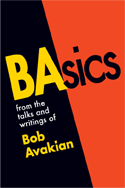
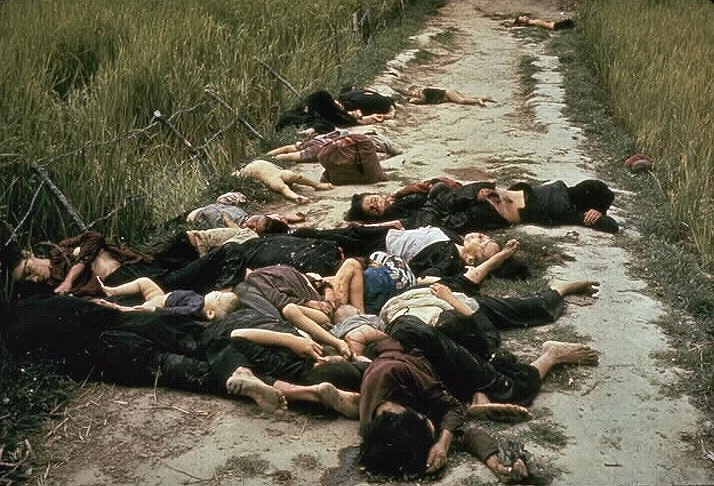 Villagers massacred by U.S. Army troops at My Lai in Vietnam, March 16, 1968.
Villagers massacred by U.S. Army troops at My Lai in Vietnam, March 16, 1968.




 The essence of what exists in the U.S. is not democracy but capitalism-imperialism and political structures to enforce that capitalism-imperialism. What the U.S. spreads around the world is not democracy, but imperialism and political structures to enforce that imperialism.
The essence of what exists in the U.S. is not democracy but capitalism-imperialism and political structures to enforce that capitalism-imperialism. What the U.S. spreads around the world is not democracy, but imperialism and political structures to enforce that imperialism.




